Proclaiming Christ from all the Scriptures, in order to Make Disciples from all the Nations
“you will be my witnesses”: five truths about witnessing from the book of acts.

Recently, as I read through Acts, the theme of witnessing came to the fore again. And how could it not?
In Acts 1:8 Jesus tells his disciples to remain in Jerusalem until the Holy Spirit comes to empower them to be his witnesses in Jerusalem, Judea and Samaria, and to the ends of the earth. Indeed, “witnessing” is something more than a spiritual discipline or a Tuesday night activity. It is the very essence of who we are as Christians. But what does that mean? And how exactly are we to speak about Jesus?

“Witness” and “Witnessing” in Acts
Perhaps the best way to answer that question is to see how the apostles “witnessed” to Jesus in the book of Acts. After Jesus’ identifies his followers as his witnesses in Acts 1:8, Luke uses the word μάρτυς 12 more times to describe the witness-bearing of the early church (1:8, 22; 2:32, 40; 3:15; 4:33; 13:31; 14:3, 17; 22:5, 20, 15; 26:16). (He also uses the verb μαρτύρομαι twice, 20:26; 26:22).
From observing how this word is used we can begin to sketch what a faithful witness might look like. While a whole theology of witnessing could be written from Acts and the rest of the New Testament (e.g., see Allison Trites, The New Testament Concept of Witness ), let me suggest five truths about witnessing from the book of Acts.
Five Truths About True Witnessing
1. Witnessing is personal.
Jesus begins by telling his disciples that in just a few days they will receive his Spirit, and when they do, Jesus says, “you will be my witnesses.” From John, we know Jesus’ Spirit is called the “comforter” or “helper” (παράκλητος). He will take Jesus’ place and be just like him (ἄλλος in John 14:16). In other words, the gift of the Spirit is the gift of Jesus’ very presence mediated by the Spirit. In this way, he will continue to be with them and in them (John 14:17).
Conversely, the disciples will be his personal witnesses. Witnesses bear testimony about what they know, and in this case it is Who they know. As John testifies in his first epistle, “That which was from the beginning, which we have heard, which we have seen with our eyes, which we looked upon and have touched with our hands, concerning the word of life (1:1), so we bear witness to the God who we know. Witnessing is not possible for those who do not know Christ; and it is strengthened as those who know the Lord grow in love with and knowledge of the One who saved them.
2. Witnessing is primarily about the resurrection.
The first place where the content of witnessing is described is Acts 1:22: “. . . one of these men must become with us a witness to his resurrection.” In deciding who would replace Judas, the qualifications included eye-witness testimony of Christ’s resurrection. Significantly, the primary witness in Acts is not about Christ’s cross, but his resurrection from the dead (which, of course, presupposes and includes his cross). This resurrection-emphasis is indicated in this requirement and in the way testimony about Christ’s resurrection repeats in Acts (2:32; 3:15; 4:33; 13:30-31). In each of these verses, witness is made about the resurrection.
Accordingly, we who witness today must not speak merely of a God who is loving, a Christ who forgives sins, or a salvation that provides second chances. Such gospel messages truncate the full gospel and miss the power of Christ’s Lordship. Jesus is not a Forgiver who happens to be Lord; he is the Lord who died to secure forgiveness through his death and resurrection. Acts puts emphasis on his resurrection and we should too.
3. Witnessing is Christ-centered.
If witnessing focuses on Christ’s resurrection, it also includes all that he said and did. For instances, Acts 5:32 says the apostles bore witness to “all these things.” The “these things” are explicated in the previous two verses: “The God of our fathers raised Jesus, whom you killed by hanging him on a tree. God exalted him at his right hand as Leader and Savior, to give repentance to Israel and forgiveness of sins” (vv. 30–31). Death, resurrection, and exaltation to the right hand of God were assigned to Christ, so that he might send his Spirit to grant repentnace which provides salvation; these are the primary facets of the gospel. And they are what true witnesses proclaim.
Likewise, Acts 10:39 speaks of the comprehensiveness and Christ-centeredness of true witnessing, “And we are witnesses of all that he did both in the country of the Jews and in Jerusalem.” Like in Acts 5, Peter’s words are not without content. Rather, Acts 10:39b–43 highlight the main points of the gospel:
They put him to death by hanging him on a tree, 40 but God raised him on the third day and made him to appear, 41 not to all the people but to us who had been chosen by God as witnesses, who ate and drank with him after he rose from the dead. 42 And he commanded us to preach to the people and to testify that he is the one appointed by God to be judge of the living and the dead. 43 To him all the prophets bear witness that everyone who believes in him receives forgiveness of sins through his name.
Under Jesus’ command his witnesses are to testify about him, just like the prophets of old. And like the prophets God chose to carry his message, we see in Acts 10:41 how God chooses us, as well. We do not choose to be his witnesses; he chooses us. Therefore, just as the center of our message is Christ, so is our source. Only by God’s gracious election in Christ will we be, can we be, witnesses to Christ.
4. Witnessing is accompanied by the witness of the Spirit.
After the apostles identifies themselves by their testimony in Acts 5:32, they identify the Holy Spirit as bearing witness with them: “. . . and so is the Holy Spirit, whom God has given to those who obey him.” As Jesus promised in Acts 1:8, the Spirit would empower his disciples to bear witness. In fact, it is impossible to proclaim Christ without the Spirit. Therefore, witnessing is not something we do in our own strength, it requires the gracious work of the Spirit in us.
Therefore, witnessing is a profoundly spiritual activity. Just as the early church received the Spirit and had multiple subsequent”fillings of the Spirit” (4:8, 31; etc.), so we rely on the power and presence of the Spirit, too. Witnessing requires faith, prayer, and the power of the Spirit. In short, to witness to others, we need the witness of the Spirit.
5. The goal of witnessing is the salvation of others, not just the dissemination of (gospel) information.
In Bill Bright’s book, he defined evangelism as sharing the good news “and leaving the results up to God.” To be sure, this is a liberating principle: God grants salvation, not us. However, I wonder if it may lead to a kind of evangelistic indifference. I can imagine someone justifying, “It’s all up to God, so as long as drop a few gospel nuggets, I can minimize the awkwardness of the conversation, and trust him with the results.”Because evangelism is warfare, we come up with all kinds of excuses to witness.
For that reason, we need to steel our hearts with promises of the gospel’s success and our responsibility to stand up as witnesses to proclaim the gospel with power. One of those promises is that when the elect of God hear the good news of Christ’s resurrection they will repent and believe. Acts 13:32–33 says, “we bring you the good news that what God promised to the fathers, this he has fulfilled to us their children by raising Jesus.” The “we” and “us” in these verses are defined as “witnesses” in verse 31. Jesus taught his disciples how he was the fulfillment of the Old Testament promises, and now as his witnesses they explained these things to others, so that in hearing the gospel they might believe. Verses 33–47 demonstrate how Christ’s resurrection fulfilled the Old Testament, and then in verse 48 Luke records, “And when the Gentiles heard this, they began rejoicing and glorifying the word of the Lord, and as many as were appointed to eternal life believed.”
In short, the apostles who received Jesus’ instruction did so in order to be witnesses of Christ. And filled with the Spirit they went out confident that their message would be heard and believed by those appointed to eternal life, i.e., the sheep of God scattered throughout the world (cf. John 10:16, 26). Therefore, witnesses go out with confidence that the gospel will be successful, and we cannot be content with simply discharging the message. Rather, we must long for the salvation of others, stopping at nothing to see others come to faith in Christ.
Let Us Walk as Witnesses
This is what we see in the book of Acts, a fellowship of disciples on mission to make disciples. To repeat what I said earlier, witnessing is not something we do; t is who we are. Thus like Paul, who said in 1 Corinthians 9 that he did everything for the sake of the salvation of others, we too should live our lives as personal witnesses of Christ, his resurrection, and everything else that he did.
To that end, let us labor, with prayerful confidence that God will take the gospel to the nations as we, his witnesses, fulfill our calling. May this short study help us understand that role, and may the witness of the Holy Spirit impassion us to grow as witnesses.
Soli Deo Gloria, ds
Share this:
One thought on “ “you will be my witnesses”: five truths about witnessing from the book of acts ”.
Pingback: “You Will Be My Witnesses”: Five Truths About Witnessing From the Book of Acts - Servants of Grace
Comments are closed.

- Already have a WordPress.com account? Log in now.
- Subscribe Subscribed
- Copy shortlink
- Report this content
- View post in Reader
- Manage subscriptions
- Collapse this bar
The Road to Emmaus: 15 Tips for Effective Witnessing
In Luke 24, we find a wonderful example of Christ’s witnessing manner and method in a powerful post-resurrection story. In this article, we’ll uncover 15 witnessing tips that can be gleaned from this one Bible passage, which can help you become a more effective and confident witness!
Let’s pick up the story in verses 13–15:
Now behold, two of them were traveling that same day to a village called Emmaus, which was seven miles from Jerusalem. And they talked together of all these things which had happened. So it was, while they conversed and reasoned, that Jesus Himself drew near and went with them (NKJV).
Witnessing Tip #1: Draw Near
Christ was not aloof. He went to where people gathered. He “drew near and went with them.” The root meaning of the phrase “drew near” is to come near in time and place. Christ sought out the hurting.
While much of the gospel work can be accomplished from afar, ultimately, most people need a personal, real-time connection. They need someone who will reach them where they are and become acquainted with them. They need someone who will sympathetically apply Scripture to their specific situations.
But before we go too far, notice the next verse …
Their eyes were restrained, so that they did not know Him (v. 16 NKJV).
What an interesting concept! Here Scripture indicates that the eyes of these two men were restrained and they did not know that it was Jesus. The Lord wanted them to be able to focus on what He was saying rather than who He was.
Drawing near to people and witnessing to them does not necessarily require that the first thing we do is adopt an in-your-face, full-disclosure approach; sometimes much more can be accomplished if we remain “undercover” and reveal things as souls are able to digest them. “I still have many things to say to you, but you cannot bear them now” (John 16:12 NKJV).
Witnessing Tip #2: Measure Your Approach
So don’t always make your purpose known unless the situation warrants it. Of course, there are times when you must let people know who you are to avoid being counterproductive. For instance, if you knock on someone’s door, they have the right to know right away who you are and why you are there.
However, in other venues, for instance, when you are traveling, you have the luxury of letting things play out, which can provide big advantages for effective witness.
But for this to occur, we need to be aware of the “conversation” and “reasoning” that we hear people using.
The word “conversation” in verse 15 comes from the Greek root for logos or “word.” The word “reason” comes from the Greek root logismos, where we get the word “logic.”
We could take this to mean that instead of making Himself known right away, Christ chose to listen to and learn about those He was trying to reach.
Witnessing Tip #3: Listen to Them
Listen to the words people are using, listen to their logic, when you are witnessing to them. You can learn much about who they are and what their needs are. This can provide a foundation and direction for what you later share when it is time to make yourself and your purpose better known. It is easier to tailor your teaching to their specific needs if you listen to their concerns and take them to heart.
What did Jesus do to gather more needed information?
He said to them, “What kind of conversation is this that you have with one another as you walk and are sad?” (v. 17 NKJV).
We can find at least two more fruitful witnessing tips in this short verse.
Witnessing Tip #4: Explore Their Hearts
Ask open-ended questions to better know your new friends and get additional background. It is simply amazing the amount of information people will volunteer once they begin talking. When you ask open-ended questions, people often don’t feel pressured and will share what’s in their hearts. They also feel valued because they are being listened to, rather than “witnessed to” or “preached at.”
But did you notice the other element in Christ’s question? He not only asked about their conversation, He also noted and asked about what their facial expressions and body language were communicating.
Witnessing Tip #5: Be Aware of Everything
Ask the Spirit to give you Christ-like awareness and discernment. Jesus saw that these two men were sad (literally gloomy or of mournful appearance), and He specifically asked them why they were so!
Facial expressions matter, and they can tell a lot about what’s going on in someone’s head. It’s never safe to assume anything based on just a facial expression, but it certainly does not hurt to ask.
Jesus’ question and observation drew a revealing response from one of His travel companions.
Cleopas answered and said to Him, “Are You the only stranger in Jerusalem, and have You not known the things which happened there in these days?” And He said to them, “What things?” (vs. 18, 19 NKJV).
As you “listen” to Cleopas, can you sense his sadness? Perhaps he sounds a little bit angry too. Interestingly, this is in keeping with the actual meaning of the word translated as “sad,” which can include the idea that the person is also experiencing anger.
But Christ, the master communicator, recognizes that it’s still not quite time to speak. He hears within Cleopas’ question the desire to share even more information, so He beckons Cleopas to continue by asking, “What things?”
As you read Cleopas’ answer, see if you can identify and diagnose the cause for his sad anger:
The things concerning Jesus of Nazareth, who was a Prophet mighty in deed and word before God and all the people, and how the chief priests and our rulers delivered Him to be condemned to death, and crucified Him. But we were hoping that it was He who was going to redeem Israel. Indeed, besides all this, today is the third day since these things happened. Yes, and certain women of our company, who arrived at the tomb early, astonished us. When they did not find His body, they came saying that they had also seen a vision of angels who said He was alive. And certain of those who were with us went to the tomb and found it just as the women had said; but Him they did not see (vs. 19–24 NKJV).
Did you see the reason for Cleopas’ anger? He offered it! So what was the problem? These two were despondent and their conversation with one another was not helping one bit; it was only further depressing them.
Bottom line, they had lost hope and were in a very vulnerable and discouraged state of mind.
Witnessing Tip #6: Be Patient
If you patiently wait long enough, people will often tell you their problems and give you a chance to offer a solution.
What Christ said next would be of vital importance to them physically, mentally, and spiritually. It could very well be the difference between life and death for them.
So what did He say?
He said to them, “O foolish ones, and slow of heart to believe in all that the prophets have spoken! Ought not the Christ to have suffered these things and to enter into His glory?” (v. 25 NKJV).
While at first it could appear that Christ’s choice of words might seem ill advised, they are actually saturated with meaning.
First, Jesus says, “Oh foolish ones.” Should a fool know better? Is a fool unintelligent or merely unwise? What exactly is a fool anyway? Well, according to one Scripture, a fool is one who says “in his heart, There is no God” (Psalm 14:1).
So what we have now is a picture of two individuals who had walked and talked with Christ for three years but were in danger of walking with God no more. They were about to give up completely, even questioning their faith and trust in God.
Let’s go to the next phrase: “slow of heart.” Slowness of heart in the Greek is bradeis cardia, and it’s where we get the word “bradycardia,” which is a term used in medicine today to describe a dangerously low heart rhythm. In other words, their spiritual foolishness had caused them to lose heart.
What was the cause of this life-threatening condition? Because they had not “believed all the prophets had spoken.” And because of this selective and faulty reasoning, what was actually a magnificent blessing was something they thought was the worst possible curse; what was depressing them was supposed to be seen as a glorious fulfillment of Bible prophecy. “Ought not the Christ to have suffered these things to enter into his glory?”
Here the entire tone of this witnessing experience changes. Christ moves from being an active listener to being an active presenter of heart-saving Bible truth!
But before we look closer at His presentation, let’s remind ourselves of several vital witnessing tips that we’ve just seen.
Witnessing Tip #7: Be Complete
Jesus continued to ask open-ended questions until He and those He was witnessing to had shared enough information to have a complete picture of the diagnosis and the solution.
Witnessing Tip #8: Be Direct
Once Jesus knew the problem and its seriousness, He wasted no time in directly, but tactfully, sharing not only His diagnosis of the problem but also the solution: believing all the prophets have spoken.
Witnessing Tip #9: Offer the Solution First
To be sure that those listening to Him were not devastated by His forthright diagnosis, He shared the conclusion—the hopeful prognosis—they needed to hear before He set out to prove it.
In essence, He said, “Look, I know your pain. I understand it from your perspective, but I’ve got good news for you. You are wrong! What you think is the worst thing in the world is actually the best!”
Of course, He doesn’t just leave them with the conclusion. Notice what He does next!
Beginning at Moses and all the Prophets, He expounded to them in all the Scriptures the things concerning Himself (v. 27 NKJV).
Witnessing Tip #10: Be Prepared to Have an Answer
Christ doesn’t just tell them that they are thinking things wrong. He also shows them how to think right through a powerful explanation of Scripture! Jesus knew they were desperate for answers. You could say that He positively reproves them, offering them the correct view of the situation on the basis of Scripture.
Of course, a systematic topical Bible study—that is, looking at everything the Bible has to say about a subject—can have a powerful effect. This is in fact what an evangelist does in every presentation. It’s what we train our AFCOE students to do: to prove and reprove all things from the Word.
Witnessing Tip #11: Make It Personal
As Jesus explains this revelation, He does it in the context of His own personal pain experience and God-glorifying testimony—“the things concerning Himself.”
The most powerful form of witness is often just a simple personal testimony. You must learn to share your testimony whenever it is most useful to do so.
Be careful, however, to not overdo it. Christ actually gauged the continued interest of those who were listening to Him. He did this by indicating that He had to continue on His journey as the other two neared their destination.
Witnessing Tip #12: Gauge Continued Interest
Always monitor whether or not you are getting through to someone or to gauge the interest level of those listening and then tie off your time while interest is still at a peak. You don’t have to share everything at once. You can feed a person too much of even the best food and give them indigestion!
Notice the response of the two men when Christ said He was leaving them …
But they constrained Him, saying, “Abide with us, for it is toward evening, and the day is far spent.” And He went in to stay with them (v. 29 NKJV).
Now, isn’t this the way you’d like people to act at the end of your Bible study? Constraining, begging you, imploring you to stay and show them more?
Of course, the best part of this wonderful passage is found in the next several verses. See if you can spot the results of effective witnessing.
Now it came to pass, as He sat at the table with them, that He took bread, blessed and broke it, and gave it to them. Then their eyes were opened and they knew Him; and He vanished from their sight. And they said to one another, “Did not our heart burn within us while He talked with us on the road, and while He opened the Scriptures to us?” (vs. 30–32 NKJV).
Did you see the results?
Effective Bible study helps people literally see Jesus. The Word is so filled with Spirit that it can take broken, helpless, “slow” of heart, sin-sick souls and bring them new life and energy. The slow of heart are instead filled with heavenly heartburn!
Witnessing Tip #13: Give the Glory to God
Remember, true witness will lead to the worship of the living Christ, not the preacher or teacher! Keep God as your focus, just as Christ always did.
Witnessing Tip #14: Leave Their Focus on Scripture
Effective witnessing will also lead you to leave while the focus of those you’ve been studying with is firmly focused on the life-changing truth of Scripture.
And what was the ultimate result of Christ’s witness that day?
So they rose up that very hour and returned to Jerusalem, and found the eleven and those who were with them gathered together, saying, “The Lord is risen indeed, and has appeared to Simon!” And they told about the things that had happened on the road, and how He was known to them in the breaking of bread (vs. 33-35 NKJV).
Witnessing Tip #15: Make Disciples
True witness will lead and inspire those who have learned the truth to share what they’ve learned with the same boldness and clarity.
What a wonderful and practical picture of effective Word-based witnessing! What a wonderful example of simple techniques that not only the disciples but you and I can use in reaching out to others for the King!
Remember, it was this one simple Bible study, given during a short seven-mile walk, that was used by the Spirit to turn the world upside down! They heard the study and were gripped and equipped by it. Their hearts were set on fire, and they couldn’t help but share it with others. And now you’ve heard it and can go share it with others too!
- Want to learn how to be a fisher of men? See how AFCOE and AFCOE to Go can give you the skills to become a confident, effective soul-winner and grow the kingdom of God!
- Please be patient. We strive to approve comments the day they are made, but please allow at least 24 hours for your comment to appear. Comments made on Friday, Saturday, and Sunday may not be approved until the following Monday.
- Comments that include name-calling, profanity, harassment, ridicule, etc. will be automatically deleted and the invitation to participate revoked.
- Comments containing URLs outside the family of Amazing Facts websites will not be approved.
- Comments containing telephone numbers or email addresses will not be approved.
- Comments off topic may be deleted.
- Please do not comment in languages other than English.


- 7 Keys for Fruitful Witnessing

Shyju Mathew
Guest posts | bible study, february 23, 2012.
- Featured Bible Study: 30 Christian Basics – Sign Up Now!
- The Father, Son & the Holy Spirit – Understanding The Trinity
- Father God and His Heart For Us – 30 Bible Study Series
- Who is Jesus? Answering a Question That Millions Have Asked
- Who is The Holy Spirit? – You Have a Personal Helper!
- Spirit, Soul and Body – 30 Bible Study Series
- What is Sin? And How to Overcome It!
- What Did Jesus Do For Me?
- How to Follow Jesus – 6 Practical Ways! [30 Bible Basics]
- Water Baptism – Why, How & Most Asked Questions
- How to Activate Your Faith [30 Bible Basics]
- The What, Where & How to Pray Effectively
- What is Worship? 7 Stages – 30 Bible Basics
- How to Read the Bible and What Matters the Most – 30 Bible Basics
- Is the Bible True? – 30 Bible Basics
- What is Christianity & Where Did It Come From? [Understanding Christian History]
- How to Know The Will of God?
- 5 Ways to Receive the Power of the Holy Spirit
- What are the Gifts of the Holy Spirit?
- All You Need to Know About Speaking in Tongues
- Red Hot Temptation!
- Spiritual Warfare – Weapons of a Believer
- The Five Offices of the Church – 30 Bible Basics
- Living the Life, Walking the Talk
- Serving the Body of Christ – Who, How & 4 CheckPoints
- How Important is the Fellowship of Believers?
- Why Give? – Tithes, Offerings & First Fruits – 30 Bible Basics
- Full Truth About the Second Coming of Jesus
- Finally, then, Brothers and Sisters, We Urge You
Welcome to “Featured Bible Study: 30 Christian Basics.” To see all the authors and titles in the series, and to suggest a topic, please go here . Subscribe today to receive the ebook on this series.
What is Witnessing?
‘Witnessing’ plainly put is to introduce Jesus to others who do not yet know Him.
Who is Called to Witness?
Are you among those who believe witnessing is something you are gifted at or you are not? Or maybe you think that’s the calling reserved for your church pastor or leadership team. Well let’s get it loud and clear – Witnessing is a command that every believer ought to follow (Mark 16:15, Matthew 28:19-20). In fact Jesus in His last words to His disciples before ascension speaks about ‘becoming His witnesses’ (Acts1:8).
More than a command, don’t you think it’s a privilege to share the love of Jesus with those who are still in bondage? For a child of God, witnessing or sharing one’s faith should come as naturally as praying, reading the word of God or any other aspect of his spiritual life. I can go to the extent of saying that unless you are witnessing, your spiritual life is dead. Let’s learn to freely give what we have freely received (Matt10:8b).
How to Witness?
There is no standardized or universal way to witness. God has created you uniquely with your own personality, background, and testimony to share Him with others the way you want. Even the same person may witness in different ways at different times. Of course the most important thing is that you should first experience knowing Christ for yourself, before you share Him with others– for you can’t share something you don’t have!
Here are seven keys that can help you to witness fruitfully:
1. It Begins With Love & Compassion for the Lost
A loving and compassionate heart is an indispensable prerequisite to be a witness. Unless you are genuinely burdened for those that are lost, you will never witness or your witnessing will be nothing more than a religious ritual. If lack of motivation is a hurdle for you to witness, pray to God that He would fill your heart with love and compassion for your fellow brethren.
2. Listen to Your Helper
Always be led by the Holy Spirit in when, how and whom to approach when witnessing. Pray and seek God’s direction in leading you to souls that may be in your locality, workplace etc. And then as God leads, by faith, take the necessary step, knowing that His promise to you is: Open your mouth wide, and I will fill it. (Psalm 81:10b).
3. All Authority is Yours
God never commands us to do anything that His grace will not enable. According to His word, as His child, you are already equipped with the tools and power you will need to succeed while witnessing. Jesus said: All authority is yours – not only on earth, but also in heaven ( Matthew 28:18-20). So cast away all your fears, inhibitions and insecurities.
4. Remember, No Effort is Small
Every effort that you make and every seed that you sow; be it through a word of encouragement, sharing your testimony, prayer etc is invaluable in the eyes of God. Never compare yourselves with others, but keep doing what God is asking you to do.
5. Be Determined
A witness is like a devoted laborer. Once a seed is sown, it requires much patience, prayer and faith to see it grow. Sometimes you may see fast results, but a lot of times, it may seem that nothing is happening. But then be encouraged knowing that you have done your part. Continue to pray and follow up. God loves His lost children and is more concerned about them than you. At the right time, God will cause the word that you have sown to bear fruit.
6. Be Open
Be open to creative ways of witnessing. Apart from the conventional act of giving tracts or sharing of word, there are plenty of opportunities that you can get to witness. How about sending a scriptural birthday card for someone’s birthday, instead of the regular ones? Or sharing Bible-based tweets/status updates on your social media profile? I have received emails from believers who have a scripture in their signature- now that can be a good start. Business people can keep their brand and company names originated from the Bible, which can trigger conversations. The ways are many, but the best way is the way that God leads you to, by His Spirit .
7. Be a Living Example
Last but not the least, the most effective witnessing I believe is showcased through your life, more than your words. This means to live by the principles taught by Jesus whom you proclaim. Of course, no one is perfect, but be genuine and practice what you preach. Love unconditionally, be quick to forgive, extend grace and speak words that encourage. Imagine what joy it will be when others look at life’s testimony and say, “This has to be God and I want to know Him too”.
Question: What is the biggest hurdle you face while witnessing for Christ?
Next in the series : Spiritual Warfare – Weapons of a Believer
You May Also Like…
3 keys to a glorious year in 2022, 8 keys to excellence, 10 religious natures (in you) that kills revival, does revival require tears what stops our cry from being heard, what to do when ‘wonders’ break out in your church, lavi jozèf (pati 2): fason pou antre nan destine ou – yon leson byen aprann, equilibrium [part 1]: balance with soul and spirit, covenant of love – part 2 by sandeep alexander, jounen dekouvèt – jou 2 : refize kout mato lènemi an, 6 keys to avoid building walls of offence & free overcoming offence ebook, las poderosas verdades del salmo 106: serie devocional (día 4), alzati | superare le tentazioni, popular posts…, 10 powerful ways to appreciate and receive from your pastor’s wife, what to do when someone disagrees with your faith, revival worship: moving to a deeper worship, how to differentiate a godly encounter versus imagination, 5 ways to overcome the judgement trap, 10 critical prophetic instructions for 2024, a soldier’s failure.

How to Effectively Witness for Christ
By alice a. anacioco | march 2, 2020 | comments 0 comment.
Do you still remember how you came to faith in Christ? God must have used somebody to share the good news of salvation with you. Was it a friend, a colleague, or a family member? Regardless of who that might be, now that you have received God’s gift of salvation, it’s your turn to share it with others.
But why should you do that? Why share the good news? It’s because all followers of Christ are to be His witnesses. Every Christian is commanded to “go into all the world and preach the gospel to every creature” (Mark 16:15).
However, fulfilling this mandate known as the Great Commission can be a real challenge to every follower of Jesus.
So in this article, I am going to share some guidelines or techniques on how to effectively witness for Christ.
Preach the Gospel
Does Mark 16:15 (quoted above) mean that every Christian must become a pastor or a preacher and speak from a pulpit or platform in order to proclaim the good news of salvation? Of course not!
To “preach” does not necessarily mean to deliver a sermon to an assembled group of people. We simply have to reach out to the lost and introduce the gospel to them. And like I said, this was a command (from Jesus), not a suggestion.
Did you know that this command was not obeyed immediately? Jesus’ disciples stayed in Jerusalem for many years after the church was born at Pentecost. It was only when the persecution started that Christianity began to spread to the world. And when it did, it spread robustly and continues to.
The more the church was persecuted, the faster the gospel propagated.

Important Note:
In many Bibles, Mark 16:9-20 is footnoted in some way because apparently, it did not exist in the earliest Greek manuscripts of the gospel of Mark.
Although the vast majority of later manuscripts include this passage, the two oldest and most respected manuscripts the Codex Vaticanus and Codex Sinaiticus (dated from 325 and 340 A.D.) do not contain this section. A few ancient manuscripts put asterisks next to Mark 16:9-20 to indicate that it is an addition to the original text.
Nevertheless, many very early Christians referred to this passage in their writings, which shows that they accepted it as genuine. But whether this portion of Mark’s gospel was written by Mark or was added later on by scribes, it is important to note that it offers no new information, nor does it contradict previously revealed events and/or doctrines.
Why Should Christians Share Their Faith?
Aside from the fact that God has commanded us to do so, we share our faith as a demonstration of our love for God. Jesus said that if we truly loved Him we should keep His commandments (John 14:15).
Christians must also share their faith because all are lost (Romans 3:10, 23) but God desires to save all people (Acts 4:12, 2 Peter 3:9; 1 Timothy 2:4). Sharing our faith in God’s chosen method to tell all people what Christ has done at Mount Calvary for the forgiveness and salvation of man.
God could have used angels but He didn’t. It’s because only redeemed sinners can tell lost sinners about Christ (Romans 10:14-17; Acts 8:13).
We must share our faith because someone once shared their faith with us. It may have been a faithful Bible teacher, or a godly pastor, or a praying parent. In other words, they have the right to expect that we will do for others what they have done for us.
Effective Witnessing Techniques
1. be a clean vessel for god..
First, to be an effective witness for Christ, we must be clean vessels. God reminds Isaiah the prophet of this, “Be clean, you who bear the vessels of the Lord” (Isaiah 52:11). We cannot expect to share our faith successfully if we are deliberately living in sin and disobedience to God.
We must confess our sins to God and forsake them , then yield our lives completely to God. Although God does not demand golden or silver vessels, He does require clean ones. (Notice that God used and continues to use imperfect people.)
2. Pray, pray, pray.
Prayer is very important if we are to be effective soul-winners for Christ. Before we even attempt to evangelize, we pray not only for the blood covering of Jesus upon us because we will be engaging in a spiritual battle but also for God to open doors so we can proclaim the gospel.
We must pray that God will lead us to the people He wants us to share the gospel with; we pray that God will open their hearts to receive the gospel.
When Paul and Barnabas returned to Antioch in Syria from speaking to great multitudes at Iconium and Lystra, passing through Pisidia, Pamphylia, Perga, and Attalia, they gathered the church together and reported all that God had done through them and how He had opened a door of faith to the Gentiles (Acts 14:27).
We also read in Colossians 4:3-4 that Paul asked the brethren to pray for him and his companions so that God will open a door for the message of the gospel, and for him to proclaim it clearly as he should.
3. Be totally dependent upon the Holy Spirit.
Before His ascension, Jesus gave a specific instruction to His disciples to not leave Jerusalem but to wait for the Holy Spirit to come upon them and empower them to become His witnesses not only in Jerusalem, in all Judea and Samaria, but also to the ends of the earth (Acts 1:4, 8).
We must acknowledge that we cannot be effective witnesses for Christ without the Holy Spirit to work on our behalf. We can do nothing without God and this includes soul-winning. We do not know the right words to say; many of us may be timid and are not eloquent speakers.
But God did not only promise that He’d give us the courage to speak, but He’d also give us the words to proclaim.
The apostle Paul, who used to be a zealous Jew taught by Gamaliel, said to the church in Corinth in his first letter that he knew nothing except Jesus Christ and Him crucified. He then went on to say that he was proclaiming his testimony about God to them not with wise and persuasive words, but with the demonstration of the Spirit’s power (1 Corinthians 2:1-5).
On the day of Pentecost, Peter preached the most powerful sermon ever that led to the conversion of 3,000 souls in one day. How did he do that? The Holy Spirit enabled him.
These two instances in the ministry of Paul and Peter clearly illustrate that without the empowerment of the Holy Spirit, we cannot possibly share the gospel effectively.
One side note: It’s not your job to convert people to Christ. Your job is to share the Gospel. So do your job of sharing the gospel and allow the Holy Spirit to do His job of convicting.
4. God is patient with lost sinners.
One other thing we need to keep in mind is that God does not want anyone to perish, but for everyone to come to repentance (2 Peter 3:9).
The leaders of Israel had rejected the ministry of John the Baptist and the ministry of Jesus, yet God gave them another opportunity to repent and be saved. They had denied and slain their own Messiah, yet God patiently held back His judgment and sent His Spirit to deal with them.
God’s people today need patience as they witness to a lost world.
Had there been times when you lost patience with someone you’re witnessing to because it looked like it wasn’t working? Let me just say that whenever you’re tempted to lose patience with the lost and want to give up, remember how God has been patient with you up until today.
Now, the question you may want to ask is: At what point should we stop trying to convince someone their need of a Savior? If after repeatedly sharing with them the bad news (we are all sinners) and the good news (Christ paid for our sins by His suffering and death) but they’re not interested, I believe it’s time to move on to the next person on your list.
Matthew 7:6 says, “Do not give what is holy to the dogs; nor cast your pearls before swine, lest they trample them under their feet, and turn and tear you in pieces.” In other words, we should not shove the gospel down the throats of people who do not want it; they will just continue to mock God and His Word.
5. Learn to do basic Apologetics.
One of the most effective tools in witnessing is apologetics, from the Greek word apologia , meaning to give a defense.
We first read this word from Peter when he said in his epistle, “But sanctify the Lord God in your hearts, and always be ready to give a defense to everyone who asks you a reason for the hope that is in you, with meekness and fear” (1 Peter 3:15).
In short, apologetics is the science and art of defending the Christian faith by using reasons and evidence.
When Peter and John were brought before the rulers, elders, scribes and priests, (including Annas the high priest), and was asked in what power or by what name has he been performing miracle healings, Peter implored apologetics. He gave a clear defense of the gospel by declaring to them the fact of Jesus’ death and resurrection (Acts 4:5-14).
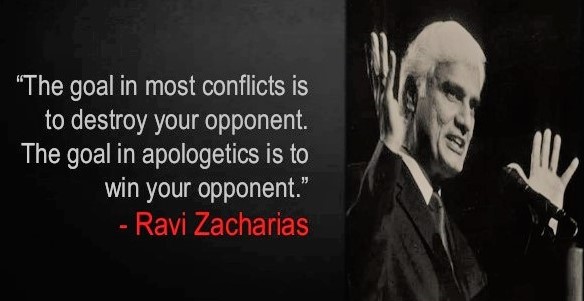
Can you give an answer as to why you’re a Christian? Why do you believe Christianity is true? What’s your basis in claiming that the Bible is God’s Word? You do not have to attend seminary school, but as a Christian, you must be able to explain why you believe what you believe.
I often hear many Christians (including pastors) say this to non-Christians: “Just believe.” And I’m like, “What? Seriously?” Haven’t these Christians read how Jesus gave evidence for His claim of divinity by performing miracles? He did not just claim to be God by attributing to Himself God’s name (I Am); He did many miracles to prove it. The climax being His resurrection!
Christianity hinges on the fact of Jesus’ resurrection and the historical evidence for the resurrection is very strong and compelling. This alone should be enough to give Christians confidence that they did not believe in vain.
6. Learn Polemics
Polemics is a strong verbal or written attack on someone or something.
Polemics is the other side of apologetics. If apologetics is defense, polemics is offense. As Jay Smith always says, “The best defense is a good offense.” In basketball, you don’t win the game just by defending the goal; you win by attacking the basket and scoring against your opponent.
This is not only true in the game of basketball or soccer, but also in witnessing.
While in Thessalonica, it was Paul’s custom to go into the synagogues of the Jews for days, months, and even years, to argue and reason with them persuasively from the Scriptures about the kingdom of God. He would explain and prove that the Messiah had to suffer and rise from the dead (Acts 17:1-3; 19:8-10).
Do you see what Paul had been doing? He’s on the attack! He did not just wait for the Jewish religious leaders to question him; he went to them and proclaimed the suffering, death, and resurrection of the Lord Jesus.
So how and where do you begin? You can start the conversation by asking what they believe about life and death, or heaven and hell. Ask them where they think they will go should they die today and why.
7. A changed life is the best defense of the truth of Christianity.
In his evangelistic ministries, Methodist preacher Samuel Chadwick used to pray for “a Lazarus” in every campaign, “some great sinner” whose conversion would shock the community. He got the idea from John 12:9-11.
God answered his prayers in meeting after meeting as infamous wicked individuals trusted Christ and became witnesses through their changed lives.

This is Paul’s exhortation for all Christians in Ephesians 5:1-2, “Therefore be imitators of God as dear children. And walk in love, as Christ also has loved us and given Himself for us, an offering and a sacrifice to God for a sweet-smelling aroma.”
You may have heard this exhortation from most pastors about living the faith as followers of Jesus. “Be careful how you live your life because you may be the only Bible unbelievers will ever read.”
Concluding Words
When the disciples asked Jesus what are the signs of His coming and the end of the age, He said to them:
“Watch out that no one deceives you. 6 Many will come in my name, claiming, ‘I am He,’ and will deceive many. 7 When you hear of wars and rumors of wars, do not be alarmed. Such things must happen, but the end is still to come. 8 Nation will rise against nation, and kingdom against kingdom. There will be earthquakes in various places, and famines. These are the beginning of birth pains.
9 You must be on your guard. You will be handed over to the local councils and flogged in the synagogues. On account of me, you will stand before governors and kings as witnesses to them. 10 And the gospel must first be preached to all nations” (Mark 13:5-10).
The end is near, the days are evil. Jesus is coming soon. Christians need to work double-time to witness to the lost.
The Great Commission still stands. Are you fulfilling it?
Recommended Resource: The Case for Christ, Revised & Updated: A Journalist’s Personal Investigation of the Evidence for Jesus by Lee Strobel

Retracing his own spiritual journey from atheism to faith, Lee Strobel, former legal editor of the Chicago Tribune, cross-examines a dozen experts with doctorates from schools like Cambridge, Princeton, and Brandeis who are recognized authorities in their own fields.
Strobel challenges them with questions like: How reliable is the New Testament? Does evidence for Jesus exist outside the Bible? Is there any reason to believe the resurrection was an actual event?
In this winner of the Gold Medallion Book Award and two-time nominee for the Christian Book of the Year Award, Strobel’s tough, point-blank questions play like a captivating, fast-paced novel. But it’s not fiction. It’s a riveting quest for the truth about history’s most compelling figure.
The new edition includes scores of revisions and additions, including updated material on archaeological and manuscript discoveries, fresh recommendations for further study, and an interview with the author that tells dramatic stories about the book’s impact, provides behind-the-scenes information, and responds to critiques of the book by skeptics.
This updated edition will prove even more valuable to contemporary listeners.
Leave a Reply Cancel reply
Your email address will not be published. Required fields are marked *
Cote d'ivoire
South africa, philippines, south korea, netherlands, switzerland, el salvador, latinoamérica y el caribe, puerto rico, trinidad & tobago, united states, new zealand.

- Login Settings
- How to Know God
- Train & Grow
- Opportunities
- Need Prayer
- Talk to a Mentor
- 4 Spiritual Laws Interactive
- Have You Heard of the Four Spiritual Laws?
Do you know that there are laws in our country that control the way we live? Find out more.
- What is Christianity?
Learn the basics of what Christians believe.
- FAQs About Christianity
Get the answers to frequently asked questions on Christian beliefs and practices.
- Dealing with Life's Questions
Explore answers to life's biggest questions.
- My Story: How My Life Changed
We all have a story. Read about individuals who have been transformed by faith.
- Issues I Face
The four symbols represent the central message of the Bible.
- Spiritual Growth
Take the next step in your faith journey with devotionals, resources and core truths.
- Life & Relationships
Explore life's questions from trials and hardships to dating and marriage.
- Bible Studies
Find resources for personal or group Bible study.
- Share the Gospel
Understand evangelism and strategies to help share your faith story.
- Help Others Grow
Help others in their faith journey through discipleship and mentoring.
- Leadership Training
Develop your leadership skills and learn how to launch a ministry wherever you are.
- Language Resources
View our top Cru resources in more than 20 languages.
PRAYER is the heart of Great Commission Movement of Nigeria ministries.
Helping students know Jesus, grow in their faith and go to the world to tell others.
- Digital Ministry
We’ve seen firsthand how digital tools can be used for advancing the Great Commission.
FamilyLife provides transferrable, biblically-based help for you at every stage...
- Jesus Film Project
Helping to provide media tools, training, strategies and resources for evangelism in every needed language.
- LeaderImpact
We believe God puts leaders in positions of influence in all segments...
- Global Church Movements (GCM)
It focuses on working in partnership with churches on a non-denominational basis...
- Agape Humanitarian Aid Foundation (AHAF)
It focuses on a holistic approach to the Gospel to meet the physical, emotional, social and spiritual needs of vulnerable people.
- Police and Military Ministry
The Police and Military Ministry focuses on reaching and raising multiplying disciples for Christ through effective partnership with Churches in the barracks.
- Athletes in Action
A Christ follower on every team, in every sport and in every country.
- GCMN - Internship Application
- Reference Questionnaire-Intern
- Opportunity for Involvement
- Our Mission in Nigeria
Position and empower teams* of mission-minded people in the 36 States and Federal Capital Territory w
How we seek to journey together with everyone towards a relationship with Jesus.
Leading from values so others will walk passionately with God to grow and bear fruit.
- Our Leadership
Learn about our national, area and global leadership teams.
- Statement of Faith
What we believe about the gospel and our call to serve every nation.
Great Commission Movement of Nigeria 10 Secretariat Road Jos, Plateau State Tel: +234 -810-003-9399. Email: [email protected]; website: www.gcmnigeria.org Facebook: @gcmnig, Twitter: @gcmnig, Youtube: GCM Nigeria
Evangelism Principles
5 ways to be a better witness for christ, simple ways to introduce more people to christ..
- Testimony , Share Your Faith

When Jesus changes your life, it’s natural to want to share that hope with the people around you.
Here are five ways you can share your faith more effectively.
1. Ask Questions
Asking good questions and listening to responses well are important skills for sharing your faith.
Take time to get to know people and find out about their spiritual journeys. Focus more on listening to someone’s story and figuring out where that person is spiritually than on getting through a gospel presentation.
Jesus was a master of using questions. See Luke 5 and Matthew 11 to read about how Jesus used thoughtful questions to teach people.
2. Share Your Story
When you ask good questions and listen well, it often leads to opportunities to share your experience and what you believe.
“And if someone asks about your hope as a believer, always be ready to explain it” ( 1 Peter 3:15, NLT ).
One way to be prepared is to learn to tell your spiritual story. This can be the story of how you became a Christian or it can be the story of how God changed you in a particular area of life.
Here’s a resource that will help you be prepared to share your story .
3. Share the Gospel
Whether you’re sharing about God’s forgiveness and love through your personal story or you just want to share the foundational message of the Bible, be ready to tell someone how to become a Christian.
Check out GodTools and these other free apps that will give you access to the “Knowing God Personally” booklet and other tools to share your faith in a way that’s easy for people to understand.
4. Build Bridges Over People’s Obstacles and Objections
Building bridges over someone’s obstacles and objections takes love, wisdom and prayer. Remember that there may be more to a question than what’s on the surface.
Someone may say, “I can’t believe in God because there is too much suffering in the world.” You can present the best rational argument about the reason for suffering, but it won’t make a difference if that person’s true obstacle is that a loved one died a violent death.
People need to know that believing in God doesn’t require them to abandon their intellect, but they also need to know that God loves them and cares about their personal struggles.
Remember that you’re not trying to win an argument, you’re trying to invite people into a relationship with God.
5. Mentor People to Help Them Grow in Their Faith
It’s exciting to see people put their faith in Jesus, but that isn’t the end of the journey. In fact, it’s just the beginning of the exciting adventure of the Christian life. When people decide to follow Jesus, they need other Christians to continue to come alongside them so they can learn more about their new faith and how to grow closer to God.
Learn more about conversational evangelism , sharing the good news of Jesus through conversation, and the CoJourners paradigm for sharing your faith.
Download GodTools and start sharing your faith in a way that's easy to understand.
Related topics:, previous story, are you communicating well, can you spare some change, latest stories in evangelism principles, tell your story: 10 tips for sharing your testimony with others.
When you tell your story, it’s God who is responsible for changing people’s hearts. You are simply called to be ready and to share what God has done in your life.
30 Ways to Show Someone You Care
You can serve others to build relationships for spiritual conversations and to care for others. Here’s 30 ideas to get started.
Falling Plates Went Viral in My Family
"I had no idea that a simple evangelistic film would be shared with so many family members."
© GCMN - A ministry of Campus Crusade for Christ International. All Right Reserved.

Sharing Faith: Effective Witnessing for Christ

- February 5, 2024

Witnessing for Christ is a powerful and transformative act of sharing our faith and spreading the gospel message. It is an opportunity to make a lasting impact on those around us, guiding them towards a personal encounter with Jesus.
In this article, we will explore five key ways to share your faith more effectively, enabling you to become a compelling witness for Christ. From exploring spiritual questions to sharing your personal testimony , each method plays a crucial role in communicating the message of hope and redemption found in the gospel.
Are you ready to become an effective witness for Christ? Let’s dive in and discover how!
Table of Contents
Key Takeaways:
- Witnessing for Christ involves effectively sharing your faith and spreading the gospel message.
- Exploring spiritual questions and actively listening to others’ spiritual journeys can create a safe space for open conversations.
- Your personal testimony of encountering Christ is a powerful tool in guiding others towards Jesus.
- Being able to share the foundational message of the gospel is essential, whether through your own story or explaining God’s forgiveness and love.
- Addressing obstacles and objections with empathy and thoughtful answers helps invite people into an authentic relationship with God.
Explore Through Questions
One effective way to witness for Christ is by asking insightful questions and actively listening to others’ spiritual journeys. Instead of focusing solely on presenting a gospel presentation, take the time to genuinely get to know people and understand where they are spiritually. Jesus Himself was a master at using questions to teach and bring about spiritual transformation. By engaging in meaningful conversations and exploring through questions, you can create a safe space for those around you to open up about their own beliefs and experiences.
When we genuinely listen to others and ask meaningful questions, it shows our sincere interest in understanding their spiritual journeys. It allows us to build bridges and establish common ground, facilitating a deeper level of connection and trust. In these conversations, the goal is not to impose our beliefs but to create a space where people feel valued and respected.
Through asking questions , we can learn about the doubts, struggles, and experiences that shape a person’s spirituality. It is an opportunity to explore their perspectives, challenge assumptions, and offer insights from our own faith journey. By engaging in this way, we foster an environment of mutual learning and growth.
“Asking questions is a powerful tool in fostering a genuine understanding of others. It not only helps us connect with people on a deeper level but also allows us to address their unique spiritual needs effectively.”
Asking thoughtful questions also helps us uncover the spiritual needs and longings of those we encounter. It opens the door to share relevant gospel truths that can bring hope, healing, and transformation. By listening attentively and responding with empathy, we can meet people where they are and guide them toward the love and grace of Jesus.

Guide People Toward Jesus by Sharing Your Story
Asking great questions and actively listening to others not only creates a safe space for meaningful conversations but also presents opportunities to share your own personal testimony . Your story of encountering Christ is a powerful tool in guiding others toward Jesus. It’s through your authentic experiences and the transformative work of God in your life that others can relate to the message of hope and redemption found in the gospel. As you share your spiritual journey, be prepared to give an explanation for the hope you have in Christ (1 Peter 3:15).
What is Vision Casting – Proverbs 29:18 says, “Where there is no vision, the people perish
Check this vision – i would follow this – greg gaines.
Sharing the Transformative Power of Jesus
When sharing your story , emphasize how your encounter with Jesus has brought about change, healing, and a deeper sense of purpose. Highlight the struggles you’ve faced and how God’s presence and love have been transformative. By showcasing the impact of your personal relationship with Jesus, others can find encouragement and see the relevance of their own spiritual journey.
“I once was lost, but now I am found.” – John Newton
Like John Newton, who penned the timeless hymn “Amazing Grace,” people resonate with personal stories of redemption and transformation. Your story casts light on the path, guiding others towards a life-changing encounter with Jesus.
The Power of Testimonies
Throughout the Bible, we see the power of personal testimonies. The woman at the well (John 4), the blind man healed by Jesus (John 9), and Paul’s conversion on the road to Damascus (Acts 9) are just a few examples. Each testimony offered a unique perspective and played a crucial role in sharing the good news with others. Your story has the same potential to impact lives as you guide others toward Jesus.
Sharing your personal testimony is not about showcasing your personal achievements or becoming the hero of the story. Instead, it’s an opportunity to highlight how Jesus has worked in your life, pointing others to the source of true transformation and hope.
A Table Highlighting the Power of Personal Testimonies
Your personal testimony is an instrument in the hands of God, guiding others toward Jesus. By openly sharing your story , you can help others discover the transformative power of a personal encounter with Christ .

Using resources like the GodTools app can enhance your ability to articulate the gospel in a clear and concise manner, ensuring that the message is understood and impactful. These tools can be particularly valuable when engaging with individuals who may be unfamiliar with Christianity or have questions about the faith.
Remember, gospel sharing is not about forcing your beliefs on others, but rather, it is an invitation to experience the love and grace of Jesus. It is done in love, patience, and respect, allowing the Holy Spirit to work in the hearts of those to whom you are sharing.
By effectively sharing the gospel, you can play a pivotal role in guiding others toward Jesus, helping them find salvation and a renewed hope in Him.
Build Bridges Over People’s Obstacles and Objections
Building bridges over people’s objections and obstacles requires love, wisdom, and prayer. When someone raises a challenging question or presents an objection to the faith, it is essential to respond with empathy and understanding . Often, there is more beneath the surface, and the initial question may be a reflection of deeper personal struggles or concerns. By addressing these objections with compassion and providing thoughtful, well-reasoned answers, you can help people see that belief in God does not require them to abandon their intellect. The goal is not to win an argument but to invite them into an authentic relationship with God .
As you engage in conversations with skeptics or those exploring their faith, remember that each objection is an opportunity. By listening attentively and responding respectfully, you can address objections and answer tough questions in ways that resonate with the individual and foster genuine understanding.
“Doubt is not the opposite of faith; it is an element of faith.” – Paul Tillich
Overcoming Obstacles with Empathy and Answers
When confronted with objections or obstacles, take the following steps to guide the conversation toward a positive and transformative outcome:
- Active Listening: Show genuine interest in the questioner’s concerns. Let them express their thoughts fully and resist the urge to interrupt or dismiss their objections. Listening provides valuable insight into their underlying beliefs and fears.

- Thoughtful Answers: Provide well-reasoned responses that address the objection while keeping the focus on the individual’s spiritual journey. Consider their background, experiences, and unique perspective as you craft your answers.
- Supportive Resources: Offer additional resources such as books, articles, or testimonials that may resonate with the questioner’s concerns. Pointing them toward credible sources can aid their ongoing exploration of faith.
Remember, the goal is not to win an argument but to overcome obstacles and guide individuals towards a deeper understanding of God’s love and grace. Through prayer and a genuine desire to help others, you can make a difference in their spiritual journey.
Mentor People to Help Them Grow in Their Faith
Witnessing for Christ doesn’t end with someone accepting Jesus as their Savior; it is just the beginning of their journey. As believers, we are called to come alongside new Christians and help them grow in their faith. This process of discipleship involves nurturing and guiding individuals as they deepen their understanding of God and learn how to live out their newfound faith. Christian community and mentorship play vital roles in supporting and equipping new believers on their spiritual journey.
When it comes to spiritual growth , mentorship is invaluable. By providing guidance, encouragement, and accountability, mentors help new believers develop a solid foundation in their relationship with God and navigate the challenges they may face along the way. Through mentoring others , experienced Christians have the opportunity to share their wisdom, experiences, and insights, helping to shape and mold the next generation of believers.

“The greatest gift you can give someone is to walk alongside them on their journey of faith.” – Unknown
In a Christian community , mentorship often occurs organically, as believers engage in authentic relationships and intentionally invest in the lives of others. These communities provide a supportive and nurturing environment where new believers can find acceptance, belonging, and discipleship . Connecting with fellow Christians allows individuals to learn from one another, share their struggles and victories, and grow together in their faith.
Benefits of Spiritual Mentorship
There are numerous benefits to participating in a mentorship relationship within a Christian community . Here are a few key advantages:
- Personalized Guidance: Mentors offer personalized guidance tailored to an individual’s unique spiritual needs and challenges.
- Accountability: Mentors provide accountability, helping new believers stay committed to their spiritual goals and live out their faith consistently.
- Wisdom and Experience: Mentors share their wisdom and experiences, offering valuable insights and practical advice based on their own spiritual journey.
- Encouragement and Support: Mentors provide encouragement and support during times of doubt, struggles, and spiritual growth .
- Connection and Community: Mentorship fosters a sense of connection and belonging within the larger Christian community , promoting fellowship and mutual care.
Mentorship in Christian Community
Mentoring others within a Christian community is a transformative experience for both mentors and mentees. It creates a ripple effect, as the mentees eventually become mentors themselves, continuing the cycle of spiritual growth and discipleship . Through mentorship, we not only invest in individual lives but also contribute to the growth and strength of the entire body of Christ.
The Importance of Firsthand Knowledge in Witnessing
To be an effective witness for Christ, it is crucial to have firsthand experience of Him. Just as John the Apostle spoke of his personal encounter with Christ , we too can attest to the transformative power of Christ in our lives. Sharing personal testimonies of how Jesus has brought love, forgiveness, and changed our lives is essential in witnessing effectively. By sharing our own experiences, we demonstrate the reality and impact of a personal relationship with Jesus.

“For we did not follow cleverly devised stories when we told you about the coming of our Lord Jesus Christ in power, but we were eyewitnesses of his majesty.” – 2 Peter 1:16
When we have personally experienced the love, grace, and transformation that comes from knowing Christ, our testimonies become powerful tools for connecting with others. People are drawn to authenticity, and when we share vulnerable stories of how Jesus has worked in our lives, it can open the door for others to explore their own faith journeys. Our firsthand knowledge of Christ carries weight and credibility, influencing those around us to consider the claims of the gospel.
Sharing personal testimonies is not about boasting or seeking attention; it is about pointing others to Jesus. When we speak from our hearts and bear witness to His work in our lives, we invite others into the same life-changing relationship we have experienced. Through firsthand encounters with Christ, we become vessels of His love, mercy, and hope.
Living a Transformed Life as a Witness
Sharing our faith goes beyond mere words; it encompasses the way we live our lives. As believers, we are called to a higher standard, one that reflects the character of Christ and sets us apart in this world. Through our actions, we become living testimonies to God’s grace and love.
Scripture reminds us to “let your light shine before others, so that they may see your good works and give glory to your Father who is in heaven” (Matthew 5:16 ESV). When others witness the genuine transformation in our lives, they are drawn to the message we proclaim.
The apostle Paul encourages us to “walk in a manner worthy of the calling to which you have been called” (Ephesians 4:1 ESV). This means living out our faith in practical ways, demonstrating love, kindness, and forgiveness towards others.
By exhibiting the fruit of the Spirit – love, joy, peace, patience, kindness, goodness, faithfulness, gentleness, and self-control (Galatians 5:22-23) – we embody Christ’s teachings and make His presence tangible in the world.
Living as a Witness: A Table of Traits
Living a transformed life as a witness requires a daily surrender to the Holy Spirit, allowing Him to shape and mold us into the image of Christ. It is an intentional choice to live differently, guided by God’s Word and empowered by His presence within us.

May our lives be a compelling testimony to the transformative power of God’s love and may we inspire others to embark on their own faith journey.
Sharing the Gospel Message Effectively
The heart of evangelism lies in sharing the gospel message. It is essential to have a clear understanding of the core message of salvation through Christ and be able to communicate it effectively to others. By using tools such as Romans 3:23-25, which highlights humanity’s need for a Savior and Christ’s redemptive work, we can share the good news in a way that resonates with people.
Sharing the gospel is more than just imparting information; it is an act of love and obedience to God’s call to share His message of salvation with the world. The gospel has the power to transform lives and bring hope to those who hear it.
Key Points:
- Clear Understanding: Gain a deep understanding of the gospel message, including the concepts of sin, redemption, and salvation through Jesus Christ.
- Communication Skills: Develop effective communication skills to articulate the gospel message clearly and engagingly. Use relevant examples and relatable language to connect with your audience.
- Scriptural Foundation: Utilize key Bible passages, such as Romans 3:23-25, to emphasize the importance of the gospel and its relevance to humanity’s spiritual condition.
- Authenticity: Share the gospel with a sincere and genuine heart, allowing your own transformed life to reflect the power of the message you proclaim.
- Listening and Discernment: Listen attentively to the questions, concerns, and objections of others. Seek the guidance of the Holy Spirit to respond wisely and address their specific needs.
“For I am not ashamed of the gospel because it is the power of God that brings salvation to everyone who believes.” – Romans 1:16
“The gospel message is not just good news; it is the greatest news the world has ever heard. By sharing it effectively, we have the opportunity to bring hope, transformation, and eternal life to those who are lost.”
Witnessing for Christ is a sacred privilege and an essential part of our Christian journey. It is not just about sharing the message of the gospel, but sharing it effectively and with impact. By engaging in meaningful conversations and exploring spirituality through questions, we create opportunities for others to share their beliefs and open their hearts to the truth of the gospel.
Sharing our personal stories is a powerful way to guide people towards Jesus. When we authentically share how God has transformed our lives, we connect on a deeper level and demonstrate the power of a personal relationship with Christ. By addressing people’s objections and obstacles with love and understanding, we help them see that faith in God can coexist with reason and intellect.
Mentoring new believers and living transformed lives are equally important in our witness for Christ. Through discipleship and Christian community, we support and equip others to grow in their faith, ensuring that our impact extends beyond the moment of conversion. By living out the truth of the gospel in our daily lives, we become living testimonies to God’s grace and love.
As we faithfully witness for Christ, we trust in the Holy Spirit’s work in the hearts of people, drawing them to the life-changing message of the gospel. Let us continue to share our faith effectively, with compassion and grounded in the truth, knowing that our witness makes a lasting impact on those around us.
What does it mean to witness for Christ?
Witnessing for Christ is the act of sharing your faith and spreading the message of the gospel to others. It involves effectively communicating the transformative power of Jesus in your own life.
How can I effectively share my faith?
One effective way to share your faith is by asking insightful questions and actively listening to others’ spiritual journeys. By engaging in meaningful conversations, you create a safe space for people to open up about their beliefs and experiences.
Why is sharing our personal story important in witnessing for Christ?
Sharing your personal story of how you encountered Christ can be a powerful tool in guiding others towards Jesus. It helps others relate to the message of hope and redemption found in the gospel.
How can I guide others towards Jesus by sharing the gospel?
Be prepared to articulate the foundational message of the gospel, whether through your personal testimony or by explaining the forgiveness and love of God. Utilize tools and resources, such as apps like GodTools, to make sharing the gospel more accessible and understandable.
How should I respond to objections or obstacles raised by others?
When someone raises challenging questions or objections to the faith, respond with empathy and understanding. Address these objections with compassion and provide thoughtful, well-reasoned answers that invite them into an authentic relationship with God.
How can I mentor and support new believers in their spiritual journey?
As believers, we are called to come alongside new Christians and help them grow in their faith. Discipleship involves nurturing and guiding individuals as they deepen their understanding of God and learn how to live out their newfound faith.
Why is firsthand knowledge of Christ important in witnessing?
Having firsthand knowledge of Christ is crucial in witnessing. By sharing personal testimonies of how Jesus has brought love, forgiveness, and transformation to our lives, we demonstrate the reality and impact of a personal relationship with Jesus.

How can I live as a witness for Christ?
Our witness is not just about the words we speak but also about the way we live our lives. By reflecting the character of Christ and exhibiting the fruit of the Spirit, we become a living testimony to God’s grace and love.
How can I share the gospel message effectively?
It is important to have a clear understanding of the core message of salvation through Christ and be able to communicate it effectively to others. Utilize tools such as Bible verses that highlight humanity’s need for a Savior and Christ’s redemptive work to share the good news in a way that resonates with people.
What is the impact of witnessing for Christ?
Witnessing for Christ is a sacred privilege. By sharing our faith effectively, we make a lasting impact on those around us and trust that the Holy Spirit works in the hearts of people, drawing them to the life-changing message of the gospel.
Source Links
- https://www.gotquestions.org/effective-witness.html
- https://www.focusonthefamily.com/bring-your-bible-old/evangelism-sharing-your-faith-with-others-and-how-to-evangelize/
- https://www.cru.org/us/en/train-and-grow/share-the-gospel/evangelism-principles/5-ways-better-witness-for-christ.html

Father / Grandfather / Minister / Missionary / Deacon / Elder / Author / Digital Missionary / Foster Parents / Welcome to our Family https://jesusleadershiptraining.com/about-us/
Related Posts:
- Examples of Witnessing in the Bible
- Bible Witnessing Definition: Understanding Witness Roles
- How I can Become a Digital Missionary
- 25 Church Evangelism Ideas for Small Churches: A…
- How to Become a Digital Missionary
- Understanding Witnessing in the Bible's Context
- Digital Discipleship: Embrace Faith in the Digital Age
- Embrace Your Journey as a Digital Disciple
- Embrace Faith: Engage with Online Evangelism Today
- Explore Top Bible Witnessing Synonym Choices - Learn More!
- How Can Our Church Start a Digital Missionary Team
- Unleashing the Power of Testimonial Evangelism -…
- What Does Non Denominational Church Believe? (2024) 🕍
- Discover Online Evangelism: Spreading Faith in the…
- Tips for Spreading Christianity on YouTube
- Empowering Change with Digital Missions Initiative
- Digital Evangelist: Pioneering Tech Adoption
You are using an outdated browser. Upgrade your browser today or install Google Chrome Frame to better experience this site.
- Bible Studies
- New/Special
- Encouragement
- Christian Symbols
- Scholarly Articles
- Way of the Cross
- Thanksgiving
- St. Patrick's Day
- New Year's Day
- Steps to Peace with God
- Articles/Stories
Beginning the Journey (for new Christians) . en Español
Old Testament Abraham Jacob Moses Joshua Gideon David, Life of Elijah Psalms Solomon Songs of Ascent (Ps 120-135) Isaiah Advent/Messianic Scriptures Daniel Rebuild & Renew: Post-Exilic Books
Gospels Christmas Incarnation (Mt, Lk) Sermon on the Mount (Mt 5-7) Mark Luke's Gospel John's Gospel 7 Last Words of Christ Parables Jesus and the Kingdom Resurrection
Acts The Early Church (Acts 1-12) Apostle Paul (Acts 12-28)
Paul's Epistles Christ Powered Life (Rom 5-8) 1 Corinthians 2 Corinthians Galatians Ephesians Vision for Church (Eph) Philippians Colossians, Philemon 1 & 2 Thessalonians 1 & 2 Timothy, Titus
General Epistles Hebrews James 1 Peter 2 Peter, Jude 1, 2, and 3 John
Revelation Revelation Conquering Lamb of Revelation
Topical Glorious Kingdom, The Grace Great Prayers Holy Spirit, Disciple's Guide Humility Lamb of God Listening for God's Voice Lord's Supper Names of God Names of Jesus Christian Art

Discipleship and spiritual formation curriculum for new believers, new Christians

The Bible often uses the word "witness," that is, someone who is able to testify to what he or she has seen and experienced personally.
If you were a witness in a court of law, you would be asked to describe what you saw, what you experienced. If you tried to tell about what someone else had said about it -- beyond your own personal experience -- you would be told it was hearsay and not admissible.
Why? Because people can hold a wide variety of beliefs -- whether they are true or not. But what has happened to them personally, their story, that is something about which they are "expert witnesses."
When you met Christ and he rescued you, your life began to change, perhaps radically. Your story, your testimony, of what things were like with you before, what happened to you when you found Christ, and what has been different since then -- that will often interest people. They won't argue with your story. You are the expert on your own life. Often they'll listen.
We will come back to your witness or your personal testimony in a moment.
The Great Commission
One of the last instructions that Jesus gave to his disciples is known as "The Great Commission" -- our marching orders.
"Therefore go and make disciples of all nations, baptizing them in the name of the Father and of the Son and of the Holy Spirit, and teaching them to obey everything I have commanded you. And surely I am with you always, to the very end of the age." (Matthew 28:19-20)
Jesus also gave his disciples this promise:
"You will receive power when the Holy Spirit comes on you; and you will be my witnesses in Jerusalem, and in all Judea and Samaria, and to the ends of the earth." (Acts 1:8)
Since they had seen Jesus in action personally and had heard his teachings with their own ears, they were credible "witnesses" to their world and beyond.
Mapping Your World
What is your world? Who are the people whom God has put around you to love, to pray for, and perhaps to be a witness before?
Why don't you take a few minutes to fill in two or three names of people whom you know in each category -- especially people who you would guess aren't committed Christians at this point in their lives.
This is not a "hit list" but rather a "love list" -- a list of people with whom you have some influence. This list will remind you to:
- Pray for them. God will hear your prayers for them and work in their lives. If you love them enough to pray for them, they'll know you love them when you talk with them about Jesus.
- Introduce them to your Christian friends.
- Invite them to your baptism , if that is coming up. Having them witness your commitment to Christ can be a powerful way to introduce them to God at work.
- Look for opportunities to share your witness . Because you are praying, the Holy Spirit will be working in their lives. Sometimes these opportunities come in the form of an extended conversation. Often they come when your friend mentions problems that are going on in his or her life. Remember, however, God hasn't put you there to fix your friend's problems, but to be a loving listener.
Possible outcomes of listening to a friend's problems and needs could be:
- Share how God has helped you when you have been in trouble, and plant the thought that God can help them, too.
- Offer to pray for them . If your friend knows you care enough to pray -- and that you have a spiritual side that believes in prayer -- he or she may open up even more. But don't forget the power of prayer. As you pray, God will answer your prayer for your friend.
Ask: "Is it okay if I pray for you?" If that is okay with your friend -- and you feel comfortable with this -- bow your head and speak out your prayer for your friend. If that doesn't seem the thing to do, pray for your friend during the week. Then, next time you see your friend, say, "How are things going since we talked? I have been praying for you." God may surprise you!
Prepare Your Testimony
When God gives you an opportunity to share what Jesus has done for you, it is very helpful if you have thought ahead of time what to say. That way your testimony can be more clearly communicated. Here is the typical structure of an effective testimony:
- This is what my life was like before I met Jesus . Share how you used to be and problems you were experiencing. Often the person you are talking to will begin to identify with some of these same problems.
- This is how I met Jesus . These are the circumstances. This is how I came to the place of saying "yes" to him. Explain what happened.
- These are the differences in my life since I met Jesus . Do not be afraid to admit that God is still working on you and you are not perfect. But share some of the clear changes you have seen so far.
You will find it very helpful to write down your testimony -- using this outline -- on one or two sides of a page. Yes, it is work, but it will help clarify things for you.
Your testimony shouldn't be phony or contrived. You don't want to memorize it. But you will find it helps to write it down and practice saying it to someone. That way, when it comes time to tell someone "for real," you will be much more comfortable in doing so. Being able to share it in just three minutes is a good goal to aim for. That will help you cut it down to the important elements. You can always elaborate, if you need to in a particular witnessing situation.
You may find that when you share your testimony "live" to a non-Christian friend, it comes out differently than you had planned. That is okay! It is probably the Holy Spirit working to fine-tune your testimony to speak to this particular friend's needs.
The Holy Spirit and Witnessing
The Holy Spirit is your internal guide in witnessing, too. God can "speak" to you through the Holy Spirit. Sometimes the Holy Spirit will put a very strong impression on your mind that you should speak to a certain person. Go ahead. Follow through with this. Many times you'll find that the Holy Spirit has been preparing them and that they're ready to hear your testimony of what Jesus has done for you.
Think of yourself as the junior member of a team. The Holy Spirit is the lead player who sets up the shots. But sometimes he'll pass the ball to you. Be ready for this.
Testimony and the Gospel
There is an important difference between sharing your testimony with a person and sharing the Gospel or Good News with him or her. These are complementary, but different.
- Your testimony is what Christ has done for you .
- The Gospel is explaining what Christ has done for the person to whom you are witnessing.
At this point you are learning to share your testimony, which prepares people to hear more. Ask your mentor or pastor to help you to learn to share the Good News itself. There are many simple ways to share it -- the "Bridge," the "Four Spiritual Laws," the "Roman Road," to name a few. But for the moment, learn to share your testimony.
Some Cautions
- Be careful about associating with old friends who will influence you to go back to your old, sinful lifestyle. It is okay to talk with them about Christ. That's good! But remember that you have an enemy who wants to tempt you to sin. Be careful.
- Avoid "missionary dating." Sometimes a Christian guy feels "called" to date a beautiful girl "so he can witness to her" -- or vice versa. Because we are sexual beings, too often our Christian love gets mixed up with other desires, and the clarity of our testimony is lost. Be wise.
- Be sensitive to people . Because your values have changed relative to those of your friends, you will probably seem a little weird to them. That is understandable. But remember to love. Don't be pushy, rude, impatient, or judgmental. Remember, it is the Holy Spirit who brings people to God; it is not all up to you. Love is primary here, not "success."
- Don't be afraid of not knowing all the answers . No one expects you to. Just say, "I'll find out about that and then get back to you." Then ask your mentor or pastor to help you answer the question.
- Don't be ashamed . Sometimes we are very aware that people may look down on us as Christians. That is to be expected. Some looked down on Jesus and persecuted him, too. But that did not stop him from his mission. St. Paul says:
"So don't be ashamed to testify about our Lord, or ashamed of me his prisoner. But join with me in suffering for the gospel, by the power of God." (2 Timothy 1:8)
The Centrality of Love
The central core of Christianity is love -- unselfish, giving, forgiving love. That needs to be our central motivation when we witness to people. I say that because it is easy to fall into wrong motivations.
One of those motivations is pride. "Look at how great I am! I helped a person to Christ!" It truly is exciting when God uses you this way, but be sure to give the true credit and glory to God.
Another motivation can be doctrine. I have heard street preachers whose main message is how people are going to hell. That is true. But most hell-fire and brimstone preachers seem to have too much self-righteousness and judgmentalism, but too little love.
The people who hear us share about Christ need to be able to sense our love for them. If they can't sense our love, then we need to pray until we can love as Christ wants us to.
The Testimony of Our Lives
The most powerful testimony you have is Christ working in your life to make you into a new person. Jesus said:
"You are the light of the world. A city on a hill cannot be hidden. Neither do people light a lamp and put it under a bowl. Instead they put it on its stand, and it gives light to everyone in the house. In the same way, let your light shine before men, that they may see your good deeds and praise your Father in heaven." (Matthew 5:14-16)
When your friends see your life changing, they'll be amazed and curious -- and probably a bit threatened. This is kind of a three-step process.
- Your lifestyle is undergoing visible transformation. It speaks for itself.
- Your words point to Christ, so people can understand the reason for the transformation. Unless you explain that this is Christ working in you, people will probably assume that you have "got religion" -- and miss the power of what is happened. Your explanation is your powerful testimony that points directly to Christ.
- Your love demonstrates Christ's love for the people you are witnessing to.
Don't wait until you are perfect before sharing your testimony with those around you. People don't expect perfection -- really. But when they see humility, love, and sincerity they'll be attracted to you -- and to your Savior.
Father, I pray that you will use me to help other people find you. Help my life to bring glory to you. When I am fearful of what other people might think, give me strength. Help me to share my testimony of your working in my life with whomever you inspire me to share. Let me be your witness. In Jesus' name, I pray. Amen.
Memory Verse
"In the same way, let your light shine before men, that they may see your good deeds and praise your Father in heaven." (Matthew 5:16, NIV)
Questions and Discussion Points
- Read aloud five times today's memory verse (Matthew 5:16) and write it on a card.
- Discuss. What is the difference between sharing your own personal testimony and sharing the Gospel?
- Discuss. Why do you think a person will be interested in how you became a Christian? What is the power in a person's testimony?
- Who is in your world? Discuss with your mentor the people God has placed in your world in the following categories:
- Work or school associates
- Neighborhood or store employees
- Recreation, clubs, and teams
Which of them do you think might need Christ the most?
- Pray for each of these names with your mentor. Ask God to open their hearts. Ask God to give you an opportunity to talk with each of them.
- Before I became a Christian
- How I became a Christian
- Since I became a Christian
- Assignment . This week go home and write out youimony. Then practice saying it in about three minutes. The next week share it with your mentor.
- Discuss the dangers with associating with old friends, "missionary dating," lack of love, and being ashamed.
- Discuss. Why is love so important in your witnessing?
- Discuss. Isn't just living your life all you need to do? Is sharing a verbal testimony really necessary? Why or why not?
- Review your memory verses from Lesson 1 (Ephesians 2:8-9), Lesson 2 (John 8:31-32), Lesson 3 (1 John 1:9), Lesson 4 (John 13:34-35), Lesson 5 (1 John 4:7-8), and Lesson 6 (John 3:16), and Lesson 7 (John 14:16-17).�Try to say them together with your mentor without looking at your cards.
- Pray for each other . Share with your mentor your needs to pray about and ask your mentor how you should pray for him or her. Then spend a few minutes praying for each other aloud.
- Appointment . Set a time and place to meet and go through next week's lesson.
JesusWalk: Beginning the Journey New Christian, New Believer Discipleship Training and Spiritual Formation

You can purchase one of Dr. Wilson's complete Bible studies in PDF, Kindle, or paperback format -- currently 48 books in the JesusWalk Bible Study Series.
Old Testament
- Abraham, Faith of
- Jacob, Life of
- Moses the Reluctant Leader
- David, Life of
- Songs of Ascent (Psalms 120-134)
- 28 Advent Scriptures (Messianic)
- Rebuild & Renew: Post-Exilic Books
- Christmas Incarnation (Mt, Lk)
- Sermon on the Mount (Mt 5-7)
- Luke's Gospel
- John's Gospel
- Seven Last Words of Christ
- Jesus and the Kingdom of God
- Resurrection and Easter Faith
- Early Church (Acts 1-12 )
- Apostle Paul (Acts 11-28)
Pauline Epistles
- Romans 5-8 (Christ-Powered Life)
- 1 Corinthians
- 2 Corinthians
- Philippians
- Colossians, Philemon
- 1 & 2 Thessalonians
- 1 &2 Timothy, Titus
General Epistles
- 1 & 2 Peter, Jude
- 1, 2, and 3 John
- Conquering Lamb of Revelation
- Glorious Kingdom, The
- Grace: Favor for the Undeserving
- Great Prayers of the Bible
- Holy Spirit, Disciple's Guide
- JesusWalk: Beginning the Journey
- Lamb of God
- Listening for God's Voice
- Lord's Supper: Disciple's Guide
- Names and Titles of God
- Names and Titles of Jesus
By BGEA Staff • June 1, 2004 • Topics: Evangelism
How can I witness for Christ?
Witnessing is a vital part of the Christian life; the Bible teaches that the true believer will desire to share with others what God has done for him; read John 4:28-30,39-42 and 1 John 1:1-4.
God commands us and empowers us to be His witnesses (Matthew 4:19 and Acts 1:8). Our testimony may not always be accepted, but through the Holy Spirit we can receive power to live a victorious Christian life and serve Christ effectively; read Ephesians 5:18 and Luke 11:13.
Here are a few suggestions that might help you to lead others to Christ: Live a consistent Christ-centered life (Matthew 5:17); be a friend and a good listener; pray that the Holy Spirit will give opportunity for witness and prepare the individual to receive the Word of life (John 16:7-11); and avoid arrogance and preachiness.
You should pray daily for the people on your prayer list and ask God for wisdom as you share Christ with them; read James 1:5, 3:17.
More Stories
Will Graham Devotion: Your Calling Is Evangelism
Will Graham Devotion: Why You Don’t Have to Be Afraid to Share Your Faith
Will Graham: 3 Truths for a Strong Pulpit
5 Billy Graham Answers on Showing Christ’s Love This Labor Day
Feel Inadequate to Share Your Faith?
Read Today's Devotion
Billy graham daily devotion: infinite desires.

Following God’s Word & Finding Christ’s Joy.

Latest Posts
Where is the spear , 10 ways to begin bringing others to jesus october 28, 2017.

10 Ways to Begin Bringing Others to Jesus
Have you ever had the joy of sharing Christ with someone and seeing that person come to know the Lord as their personal Savior? If so, you know there is nothing in this world like it! We know that Jesus said, “ ye shall be witnesses unto me ” (Acts 1:8).
But how do we do what Jesus said? Everywhere I go people say to me, “I really want to bring someone to Christ, but I just don’t know where to start.”
Let me give you a few ideas that you can put into practice today…
- Create a soul-winning prayer list . Write down the names of those that you know need Christ and commit to praying for them every day. In addition, ask the Lord to use you to personally reach them. But remember, we cannot pray if we are not willing to obey.
- Commit gospel Scriptures to memory . We are to be ready always to explain the gospel (Ephesians 6:15; 1 Peter 3:15). The greatest thing you can give to others is God’s Word. Begin with John 3:16 and great salvation verses out of Romans. Memorize them. Meditate on them. Minister them to others.
- Share your story . If you are a believer you have a story to tell! It is the story of how you came to know Christ and what He means to you. Next to the Scriptures, it is the most powerful resource you have. As a result, practice giving it to someone and prepare to give it to as many people as possible. Those who will never listen to a sermon will listen to your story.
- Demonstrate the love of Christ . The gospel message begins with “ For God so loved the world that He gave …” His love breaks down barriers and removes prejudices. Ask the Lord to help you show kindness to others. A little kindness may open a big door for the gospel.
- Give gospel literature to others wherever you go . So many people I have met through the years were brought to Christ when reading a gospel tract. Never underestimate the power of the printed Word. Carry literature with you. Accompany it with a personal word. God can use simple tools to accomplish His work.
- Bring someone with you to a church service specifically to hear the gospel . Communicate to your pastor that you are bringing someone with you who needs the Lord. In addition, pray that God will open their heart as they hear the truth.
- Have a Bible study in your home or on the job . Hosting an informal Bible study will give opportunities to discuss spiritual truths with neighbors and co-workers. Many people who would not go to a church meeting would come to a friend’s home. (Check out our Bible Reading Plans of the Bible App; you can study through them as a group).
- Ask people to read the Gospel of John and to tell you what they think . I have had the joy of seeing people come to faith in Christ through simply reading the Scriptures. At the very least, it opens the conversation about who Christ is. The Word of God is powerful!
- Pray daily for divine appointments . Ask the Holy Spirit to give you someone to talk to. That is a prayer He will answer! Then live expectantly, looking everywhere for people that you can share the good news with.
- Begin . No one becomes an effective witness by reading about it. So, it is time to get off the bench and get in the game! We all get nervous, but as we obey the Lord He has promised to help us.
In conclusion, ask the Lord to prepare the heart of some soul and give you a divine appointment today! May God use us all to bring someone to Jesus.
Post Author
More from similar topics, subscribe to blog via email.
Email Address
Recent Posts

Fellow Helpers to the Truth
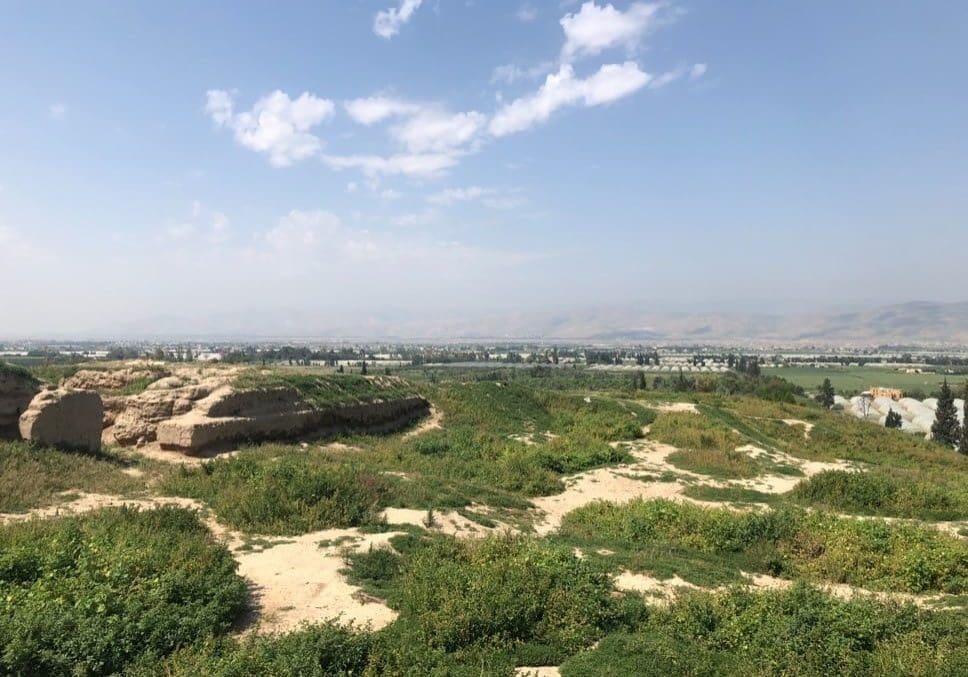
Deir Alla and Balaam’s Curse

Whatever Happened to the Fear of God?
- Uncategorized (101)
- Guest Post (43)
- Personal Growth (174)
- Family and Friends (191)
- Revival (16)
- Youth Ministry (44)
- Gospel (11)
- Biography (24)
- Prayer (69)
- Prophecy (4)
- Devotional (212)
- Marriage (3)
- Current Events (214)
- Jesus Christ (5)
- Social Media (7)
- Christians You Should Know (46)
- Christian Witness (76)
- Updates (7)
- Church Ministry (178)
- Bible Culture and Customs (35)
- Reflections on Life (125)
- Preaching (70)
- Evangelism (215)
- parables (2)
- The Daily Christian Life (17)
- Bible teaching (6)
- Tools for Believers (27)
38 Comments
A few miscellaneous thoughts about soulwinning– 1) You can never give the gospel to the wrong person! [The unsaved need it, and the saved do not mind hearing it from another Christian.] 2) Anything other than a definite “Yes!” is a definite “No!” [Regarding…when attempting to discern if one already knows Christ as their Savior.] 3) You will never be a soulwinner if you never get started! [Decide today to obey Christ in this matter!] Remember: What you value will govern the pursuits of your life!
Thank you. I will open my heart to Jesus and give others who are good the peace and love they deserve.
Great tips to bring others to think about their salvation, I will give it a try, thank you very much, God Bless you.
Thank you and may God use you to bring many to Him!
God bless you I will use this tips tomorrow to teach others
Thank you for passing it on!
Anita God bless you thank you for obeying to serve God.
They will tell we are Christians by our love one for another. The greatest commandment is love the Lord your God with all your heart mind soul strength. The second is like it love your neighbor as yourself. On these two hang all the law and the prophets. One might ask what is love? Read 1st Corinthians chapter 13 love is patient love is kind love does not envy it does not boast it is not rude it is not self-seeking it is not easily angered it keeps no record of wrongs love does not Delight in evil but rejoices with the truth it always protects always trusts always hopes always preserves Love Never Fails. Now there are three things that remain faith hope and love but the greatest of these is love. Glory to the father in the highest
Thanks for reading and your comments!
Thanks for sharing this .
We appreciate you taking time to read it.
I just asked God and Google to give me more ways to be a soul winner. Good stuff. Thank you very much
May God answer your prayers!
May God continued to show you the way to bring men him
Amen! Praying God will all of us.
Thank you lord for answering me on how to bring some one to Christ. Amen
Praying God will use you!
ameeeeeeeeen
Thank you for this
Happy that it was a help. God bless you!
Thanks very much!
May God use you to bring many to Christ!
Thank you so much for the guidance. Iam going to give it a try God bless you!
May the Lord use you to bring many to Him!
Hello I’m Sister Diane, And I just wanted to take a moment to say Thank you for sharing this great news for I’m a Devotional Teacher on Facebook @Daily Devotional Reading and have enjoyed reading this for I have been struggling with a vision that God has given me, in my vision I was on a beach teaching and from the distance people are coming in. Now the struggle isn’t what my calling is, it’s where do I go to teach for I already know my hometown isn’t going to believe me or accept me for my calling and honestly that’s find with me even though my family says I do not teach I preach ?. P.S. Can you help me or lead me in the right direction please for it’s like my calling is bursting to come out!
I believe that every Christian is commanded to “preach the gospel.” This does not mean that everyone will speak to great crowds or deliver sermons. Begin where you are to share the gospel. Give the message of Christ to those immediately around you. As we take the first step God will open additional opportunities.
I want to be a soul winner, May God help me in Jesus name. Amen
May God use you to point many to the Lord Jesus.
Thank you very much. This has blessed me in no little way.
God bless you.
I’m so glad. May God use you to bring many to Jesus.
Thanks so much I have been thinking on how to start my evangelism in Italy seriously am grateful
May God use you to point many to the Lord Jesus Christ!
uuuuuuuh this is powerful thank you i starting now
Yes I would like to know about how god can use me for his work
He will if you will yield to Him.
The church I attend never offer salvation, or do out reach , just preaching and conferences. Is this Good?
New Testament churches must give themselves to the gospel. We believe this work should be evident both in the gatherings of the church and through the outreach in the community. Pray and talk to your pastor. See what you can do to help get the gospel out and encourage evangelistic work in your church. It has to start with someone!
I need more of this, for soul winning thsnk you
Leave a Comment Cancel Reply
Save my name, email, and website in this browser for the next time I comment.
Notify me of follow-up comments by email.
Notify me of new posts by email.
(Habakkuk 2:4) What are the great hindrances to revival? What is it that is blocking our blessing? Perhaps at the top of the list is our pride, preventing us from drawing near to God. (08225240918)
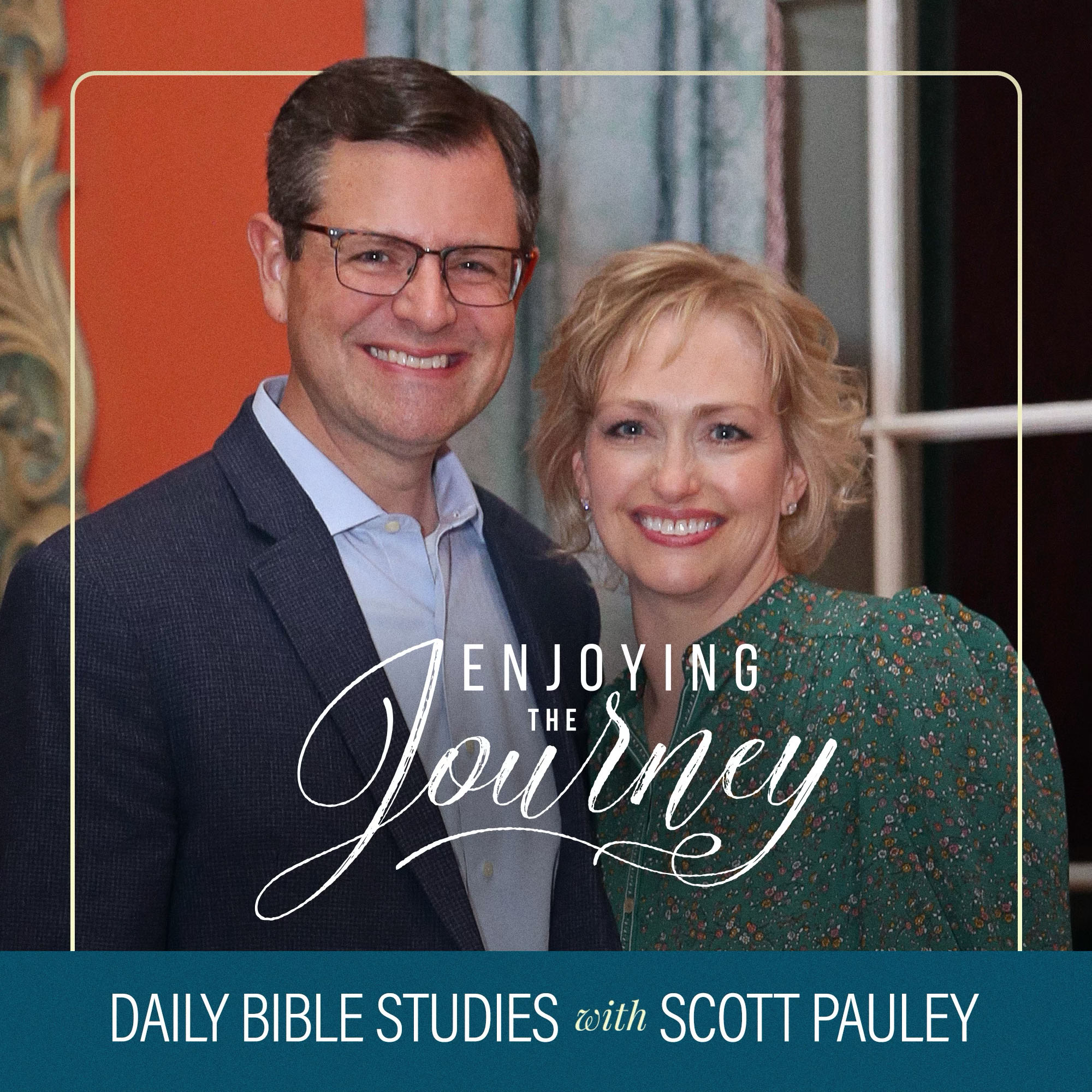
Privacy Preference Center
Privacy preferences.
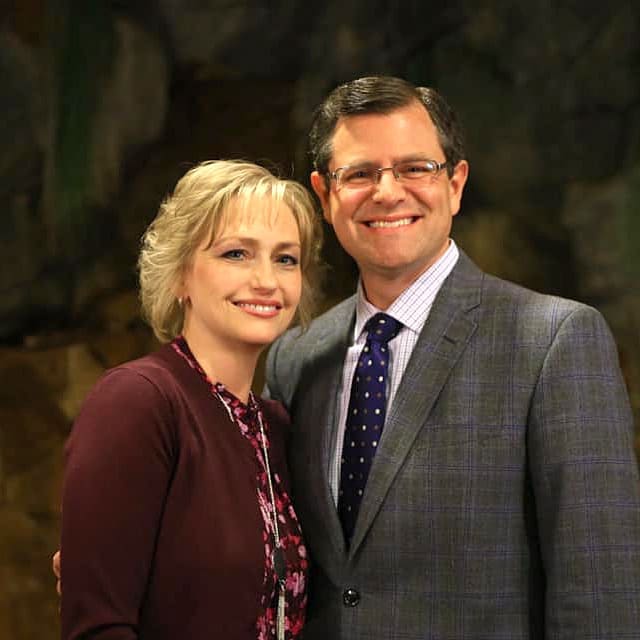
Partner with us in prayer.
I will join you in prayer for a spiritual awakening among God's people and the advancement of the gospel.
You have Successfully Subscribed!
Cote d'ivoire
South africa, philippines, south korea, netherlands, switzerland, el salvador, latinoamérica y el caribe, puerto rico, trinidad & tobago, united states, new zealand.
- How to Know God
Do you ever wonder what Christians believe? Who Jesus is, what he did and why it matters? Get answers to these questions and more.
- Spiritual Growth
Take the next step in your faith journey with resources on prayer, devotionals and other tools for personal and spiritual growth.
- Life & Relationships
Explore resources to help you live out your life and relationships in a way that honors God.
- Bible Studies
Find resources for personal or group Bible study.
- Share the Gospel
Learn to develop your skills, desire and ability to join others on their spiritual journeys and take them closer to Jesus.
- Help Others Grow
Help others in their faith journey through discipleship and mentoring.
- Leadership Training
Develop your leadership skills and learn how to launch a ministry wherever you are.
- Language Resources
View our top Cru resources in more than 20 languages.
- Quizzes & Assessments
Have some fun taking various quizzes and assessments to learn about yourself and others.
Helping students know Jesus, grow in their faith and go to the world to tell others.
Reflecting Jesus together for the good of the city.
Partnering with urban churches to meet physical and spiritual needs.
Striving to see Christ-followers on every team, in every sport and in every nation.
Equipping families with practical approaches to parenting and marriage.
- High School
Reaching students and faculty in middle and high school.
Bringing hope and resources to military families worldwide.
- Locate Cru Near You
- Mission Trips
Volunteer abroad this year on a short term global missions trip offered by one of the best, most-reliable Christian missions organizations in the world.
- 1-Year Full-Time Internships
Internship opportunities with Cru's ministries.
If you're looking for the best Christian jobs and careers, check out Cru's ministry job openings for full- and part-time missionaries and professionals.
- Go International
Live in another country building relationships and ministries with eternal impact.
- Volunteer Opportunities
Would you like to give your time to work with Cru? We need you.
Find a Cru event near you.
- Explore Your Interests
Use your hobbies and interests to find the best place for you to serve.
How we seek to journey together with everyone towards a relationship with Jesus.
- Donor Relations
Answers to questions on donations, financial policies, Cru’s annual report and more.
- Statement of Faith
What we believe about the gospel and our call to serve every nation.
- Our Leadership
Learn about Cru's global leadership team.
- Cru Partnerships
When the global church comes together then powerful things can happen.
Leading from values so others will walk passionately with God to grow and bear fruit.
- Oneness in Diversity
Cru’s position on oneness in diversity.
- Sexuality and Gender
Today we encounter a wide variety of questions related to sexuality and gender. As followers of Christ, we want to navigate LGBT+ questions in a way that is compassionate to people and faithful to scripture.
Showing God in action in and through His people.
- Start A New Gift
- Missionaries
- Featured Opportunities
- More Ways to Give
Your Account
- Your Giving
- Payment Methods
- Donor-Advised Funds
- Stock and Non-Cash Gifts
- Cryptocurrency
- Planned Giving with Cru Foundation

Help create welcoming spaces for diverse communities
It's essential for our ministers to reflect the diverse populations we are reaching with the gospel
- Cru22 Recorded Sessions
Evangelism Principles
3 tips for sharing your testimony.
- Testimony , Faith , How to Share Your Faith , Share Your Faith

If you’re looking for a natural way to talk about your faith, your own testimony is a great place to start! When you share the story of how your life has changed because of your relationship with Jesus, you become a living example of the gospel at work. But how and when do you begin a conversation like that?
The idea of sharing your testimony with someone can be intimidating. Whether you’re speaking to a close friend or a room of strangers, telling your story requires courage and dependence on the Holy Spirit .
Here are three tips to make sharing your story easier.
#1 Recognize when God is leading you to share your story.
Practice depending on and listening to the Holy Spirit. Praying regularly for opportunities to talk about your faith will make you more aware of the Spirit’s lead. Think of the people you interact with daily. Who might the Holy Spirit be calling you to share your story with?
Each of us is equipped by our testimony to introduce people to Jesus. Your story is your personal account of how God changes lives! As a psalmist wrote: “Let the redeemed of the Lord tell their story — those he redeemed from the hand of the foe” (Psalm 107:2, NIV).
Whether your testimony includes a dramatic leap of faith or a steady walk with Jesus, you should never underestimate its power. No matter the specific details of your story, when you placed your faith in Christ you became part of “a chosen people … that you may declare the praises of him who called you out of darkness into his wonderful light” (1 Peter 2:9, NIV).

#2 Identify your hesitations.
If fear is holding you back from sharing your story, the best way to overcome your anxiety is to dispel it with truth. Here are some common hesitations, and reminders to help you move forward. Consider what resonates with you most. How might God be inviting you to deeper trust in Him?
What if I don’t know the answer to a question?
When you feel unsure, pray and ask the Holy Spirit to help you. Jesus, when sending his disciples out to share the good news, warned that they’d face challenges and opposition. But he also encouraged them not to “worry about what to say or how to say it. At that time you will be given what to say, for it will not be you speaking, but the Spirit of your Father speaking through you” (Matthew 10:19-20, NIV).
You can rely on the Holy Spirit to help you know what to say. If you don’t have an answer at the moment, it’s OK to say, “I don’t know.” You can offer to look into it together or get back to them later.
What if sharing my story makes things awkward between us?
If your faith is an important part of your life, it should come as no surprise that you want to talk about it. Think of how strange it would be if your co-workers or neighbors knew nothing about your loved ones or hobbies! There’s nothing inherently awkward in talking about something so central to who you are. The apostles, when asked to stop talking about Jesus, said, “We cannot help speaking about what we have seen and heard” (Acts 4:20, NIV). Like the apostles, you can’t help but speak about God’s work in your life — it’s only natural, and too wonderful not to share!
If you sense awkwardness after talking about your faith or sharing your story, ask the other person about it. Perhaps something you said stuck with them, or maybe they’re deciding whether to ask a follow-up question. Addressing any tension will clear the air quickly and create space for them to respond.
What will this person think of me?
If this is a person you have an existing relationship with, trust that they will believe the best of you. When in doubt, make your intentions clear and ask if they’d like you to share more. Clarity and gentleness are your friends.
Remember, your identity in Christ is unshakeable. Paul writes to the Romans, “Therefore, there is now no condemnation for those who are in Christ Jesus” (Romans 8:1, NIV). The way others respond to your story does not define you. Often, desires for acceptance, approval or success are enough to keep believers from following the Spirit’s lead.
In reality, it’s unlikely that people will respond as you fear. It’s more likely your vulnerability will deepen your relationship.
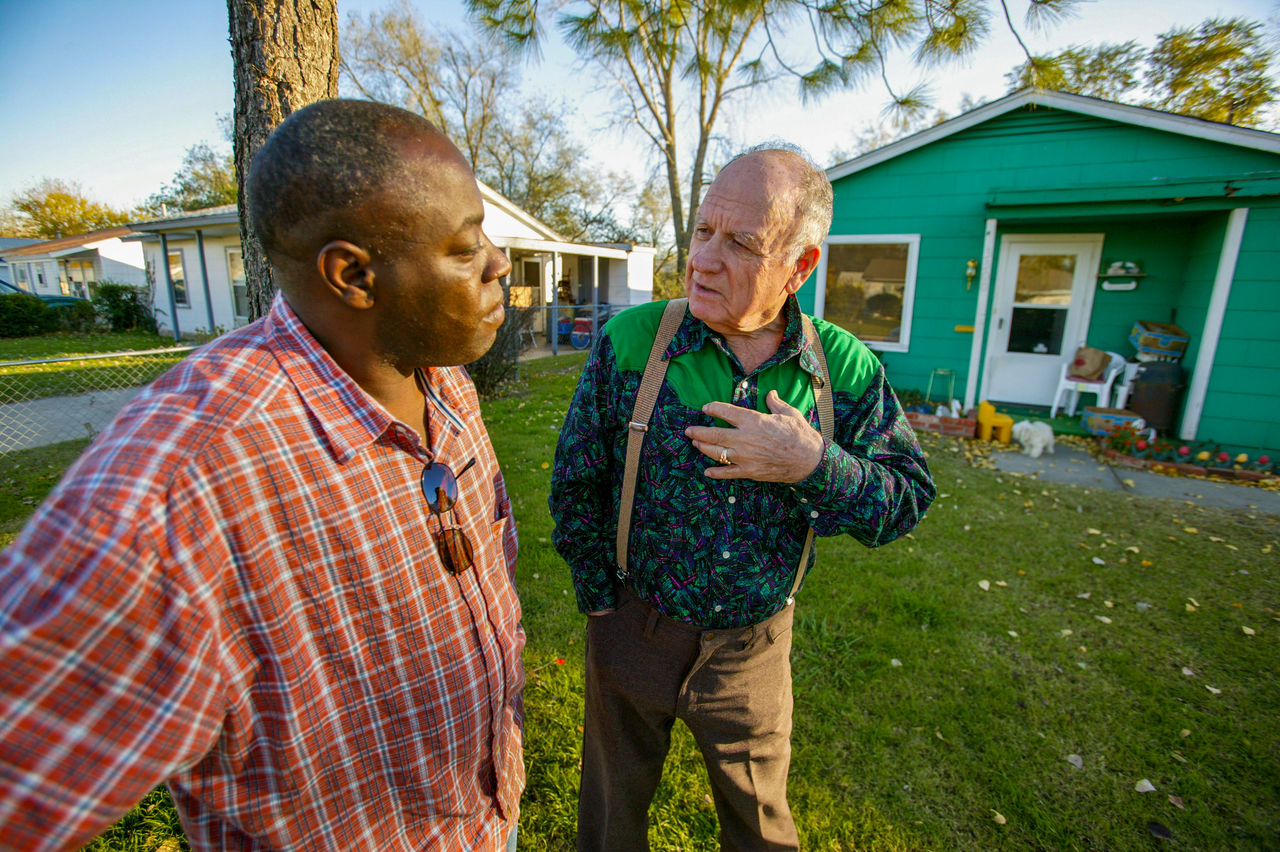
#3 Keep it simple, open and curious.
You don’t need to wait for the perfect moment or prepare the smoothest transition to start a conversation about your testimony. A simple invitation can look something like this:
“I don’t know your experience with religion or the church, but would you like to hear about how Jesus changed my life?”
“Have I ever told you about what my life was like before my faith became a priority?”
“My relationship with Jesus is important to me, which makes me wonder what your experience with faith and spirituality has been?”
Though preparation is good, no conversation is perfectly scripted. A key to sharing is listening. You don’t have to fit everything into one conversation. Allow room for the other person to ask questions and share their experience. Let them know you’re willing to share more, perhaps in a future conversation.

Your testimony is an exceptional evangelism tool because it can move naturally into sharing the gospel . And what could be more exciting than offering someone the same good news of Jesus that you’ve received? For more ways to transition into a spiritual conversation, explore the resources GodTools has to offer.
Related Topics:
Previous story, did jesus come to reach the gentiles, latest stories in evangelism principles, rescue the dying.
A classic message from Ron Hutchcraft about our primary purpose.
Videos - Cojourners
Mentor 7: reality check.
©1994-2024 Cru. All Rights Reserved.
- BIBLE SUMMARIES
- PARENT GUIDES
- SCHOLARSHIPS
- JOURNEY STORE
Journey: Witnesses
- Get a Free Lesson!
- Order Witnesses Today!
Witnesses is 32 week curriculum created to help you make disciples who make disciples. You will see excerpts and video lessons from lead evangelists, authors, and youth leaders such as Greg Stier, Harvey Carey, and Wes Stafford. These resources will provide you with what you need to train your students to live out the Great Commission, today!
"I’m excited about helping students think more deeply about how to share the gospel in our day and age. This resource will help them think about their context and how to show and share the love of Jesus in ways that connect." Ed Stetzer
Journey Witnesses Resources

Student Bible Study
This Journey study, Witnesses , trains your students to share their faith with anyone and everyone. Includes video lessons from Greg Stier, Harvey Carey, Wess Stafford and more.

Leaders Guide
Journey Witnesses Leader’s Guide includes discussion ideas, facilitation, large group teaching helps (access to outlines and presentation slides) and devotional questions – all the things you need to lead your students each week.
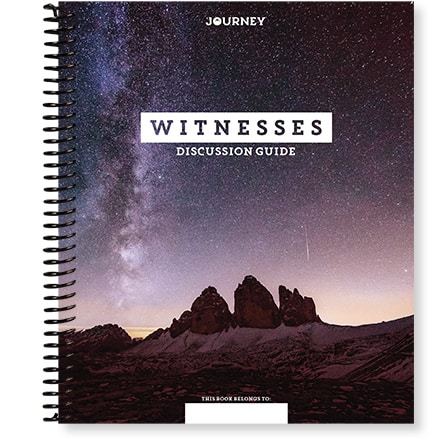
Small Group Discussion Guide
Journey Witnesses Small Group Discussion Guide includes a one-page lesson overview,the same devotions that are in the student book, small group facilitation helps and space to record student prayer requests.

Essentials Study
Essentials is an abridged version of the Bible study that makes Journey more accessible for a wider range of students and ministry environments.
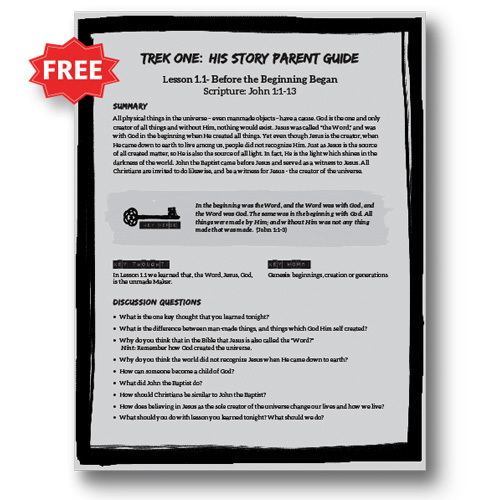
Free Parent Guides
Download these parent guides so parents of your students can follow along and engage with the discussion.
Main Studies
- Journey Disciples
- Journey Advocates
- Journey Witnesses
- Bible Reading Summaries
- Parent Guides
Pope's WYD message: Hope in the Lord and you will not grow weary
By Francesca Merlo
Pope Francis has addressed a message to young people around the world for the 39th World Youth Day. The message, entitled “ Those who hope in the Lord will run and not be weary,” centres on the theme of hope and endurance, drawing inspiration from the words of the prophet Isaiah.
In his message, Pope Francis encouraged young people to see life as a pilgrimage, a quest for happiness that is admittedly also tiring. It is precisely in this journey that hope must shine brightest, said the Pope.
Those who hope in the Lord do not tire
In light of some of the difficulties young people face, Pope Francis encouraged them to persevere. He emphasised that hope is not simply a passive feeling but an active force, one that allows us to "press forward, for it is a gift received from God Himself."
Pope Francis also addressed the fatigue that can come with life’s struggles. He noted that this weariness is common to all who embark on meaningful journeys and that the solution to such tiredness is not found in resting but in “becoming pilgrims of hope.”
In his message, the Pope invited the young people to embrace life fully, warning against the stagnation, where people "stand still with no desire to move.”
He emphasised how this apathy can often lead to a paralysing sense of futility. “I prefer the tiredness of those who are moving forward, not the ennui of those who stand still,” the Pope said.
Eucharist is the highway to Heaven
The Pope went on to compare young people’s journey to the Biblical story of Israel’s journey through the desert.
He reassured them that even in moments of crisis and despair, God does not abandon His people. Instead, like a loving Father, He nourishes them with His presence, just as He provided manna to the Israelites in the desert.
In light of this, the Pope urged the young people to rediscover the profound gift of the sacrament of the Euchraist, by reminding them that "the Eucharist is the highway to heaven.”
Not tourists but pilgrims
Looking towards the Jubilee of 2025, Pope Francis expressed his hope that the upcoming celebration would be an opportunity for young people to deepen their relationship with God and to experience His mercy and love.
He extended an invitation to all, saying: "Do not set out as mere tourists, but as true pilgrims," reminding them that the journey towards the Jubilee is not only a physical one but also a spiritual one.
Bringing his message to a close, Pope Francis encouraged the young people to be brave.
“Take courage,” he said, before assuring them of his prayers and entrusting their journey to the Blessed Virgin Mary. With her example, he concluded, young people can “persevere in their journey as pilgrims of hope and love.”
Thank you for reading our article. You can keep up-to-date by subscribing to our daily newsletter. Just click here

More upcoming events:
The Pope's Agenda

Listen to our podcasts

Subscribe to our newsletters
To get the latest news

Papal audiences

Daily readings

Saint of the day

MESSAGE OF HIS HOLINESS POPE FRANCIS FOR THE XXXIX WORLD YOUTH DAY
24 November 2024
Those who hope in the Lord will run and not be weary (cf. Is 40:31)
Dear young people !
Last year we set out on the path of hope towards the Great Jubilee by reflecting on Saint Paul’s words, “Rejoice in hope” ( Rom 12:12). In order to prepare ourselves for the Jubilee pilgrimage of 2025, this year we can take inspiration from the prophet Isaiah, who says: “Those who hope in the Lord… will run and not be weary” ( Is 40:31). These words are taken from the so-called Book of Consolation ( Is 40-55), which heralds the end of Israel’s exile in Babylon and the beginning of a new age of hope and rebirth for God’s people, who can return to their homeland thanks to a new “highway” that the Lord is presently opening up for his children (cf. Is 40:3).
Today, we too live in times marked by dramatic situations that generate despair and prevent us from looking to the future with serenity: the tragedy of war, social injustices, inequalities, hunger and the exploitation of human beings and the natural environment. Often the ones who pay the highest price are precisely young people. You sense the uncertainty of the future and are not sure about where your dreams will lead. In this way, you can be tempted to live without hope, as prisoners of boredom, depression and even be drawn to risk-taking and destructive behaviours (cf. Spes Non Confundit , 12). For this reason, dear young people, I would like the message of hope to come to you, as was the case with Israel in Babylon. Today too, the Lord is opening a highway before you, and he invites you to set out on it with joy and hope.
1. The pilgrimage of life and its challenges
The prophet Isaiah speaks of “walking without tiring”. Let us reflect then on these two realities: walking and tiredness.
Our life is a pilgrimage, a journey that pushes us beyond ourselves, a journey in search of happiness. The Christian life in particular is a pilgrimage towards God, our salvation and the fullness of every good thing. Our goals, achievements and successes along the way, if they remain only material, will, after an initial moment of satisfaction, still leave us hungry, longing for something greater. They cannot completely satisfy our soul, because we were created by One who is infinite; as a result, we have an innate desire for transcendence, a constant restless drive towards the fulfilment of higher aspirations, towards “even more”. That is why, as I have often said to you, “looking at life from a balcony” is not enough for you young people.
Still, it is normal that, while we set out on our journeys with enthusiasm, sooner or later we will begin to feel tired . In some cases, anxiety and inner fatigue are brought on by social pressures, the need to attain certain levels of success in our studies, our work and our personal life. This produces a certain despondency, as we live running from one thing to another in an empty “activism” that makes us fill our days with a thousand things and, in spite of this, feel that we never manage to do enough and never quite measure up. This tiredness is often accompanied by a certain ennui , the apathy and dissatisfaction that affects those who never set out, choose, decide, take risks, preferring to remain in their own comfort zone, closed in on themselves, seeing and judging the world from a distance, without ever “dirtying their hands” with problems, with other people, with life itself. This kind of tiredness is a kind of wet cement in which we stand; eventually it hardens, weighs us down, paralyzes us and prevents us from moving forward. I prefer the tiredness of those who are moving forward, not the ennui of those who stand still with no desire to move!
The solution to tiredness, oddly enough, is not to stand still and rest. It is to set out and become pilgrims of hope. This is my invitation to you: walk in hope! Hope overcomes all weariness, every crisis and every worry. It gives us a powerful incentive to press forward, for it is a gift received from God himself. The Lord fills our life with meaning, sheds light on our path and shows us its ultimate direction and goal. The Apostle Paul uses the image of an athlete in the stadium racing to receive the prize of victory (cf. 1 Cor 9:24). Those of you who have taken part in a sports competition – not just as spectators but as athletes – know how much inner strength it takes to reach the finish line. Hope is precisely a new kind of strength that God instils in us, enabling us to persevere in the race, to see beyond present difficulties and to press forward to the goal of communion with him and the fullness of eternal life. If a beautiful goal exists, if life has an ultimate meaning, if nothing of what I dream, plan and accomplish will ever be lost, then it is worth the effort to keep walking, exerting ourselves, overcoming obstacles and fatigue, because the ultimate prize is magnificent beyond measure!
2. Pilgrims in the desert
In the pilgrimage of life, there will inevitably be challenges to face. In earlier times, long pilgrimages involved coping with changing seasons and climates, crossing pleasant meadows and cool forests, but also snow-capped mountains and parched deserts. Even for those who are believers, the pilgrimage of life and the journey to our ultimate goal can prove tiring, as the journey through the desert to the Promised Land was for the people of Israel.
And for all of you! Those who have received the gift of faith know happy moments when we can feel God’s presence and closeness, but other moments too, when we experience the desert. It can happen that our initial enthusiasm for school or work, or for following Christ – whether in marriage, the priesthood or consecrated life – can be followed by moments of crisis, that make life seem like a difficult trek in the desert. Those times of crisis, however, are not wasted or useless: they can become important times of growth. They are moments when hope is purified! In crises, many false “hopes”, hopes too small for our heart, fade into significance; they are revealed for what they are and we find ourselves alone in facing the fundamental questions of life, with no illusions. And in those times, each of us can ask: what are the hopes on which I have based my life? Are they real hopes or simply mirages?
At those times, the Lord does not abandon us. Like a father, he draws near to us and constantly gives us the bread that renews our strength for the journey. Let us remember that to the people in the desert he gave manna (cf. Ex 16) and to the prophet Elijah, weary and discouraged, he twice offered bread and water, so that he could walk for “forty days and forty nights to Horeb, the mountain of God” (cf. 1 Kings 19:3-8). In those biblical stories, the faith of the Church has seen prefigured the precious gift of the Eucharist, the true manna, the true food for the journey, that God gives us to sustain us on our way. As Blessed Carlo Acutis said, the Eucharist is the highway to heaven. Carlo made the Eucharist his most important daily appointment! In this way, in union with the Lord, we can walk without tiring, for he is walking alongside us (cf. Mt 28:20). I encourage all of you to rediscover the great gift of the Eucharist!
In those inevitable moments of fatigue in our pilgrimage in this world, let us learn, then, to rest like Jesus and in Jesus . He told his disciples to rest after they returned from their mission (cf. Mk 6:31); he also recognizes your own need for bodily rest, time for recreation, for enjoying the company of friends, for sports and for sleep. Yet there is a deeper kind of rest, the repose of the soul, which many seek and few find, for it is to be found in Christ alone. Realize that all your inner weariness can find repose in the Lord, who says to you: “Come to me, all you that are weary and carrying heavy burdens, and I will give you rest” ( Mt 11:28). When the weariness of the journey weighs you down, come back to Jesus, learn to rest in him and abide with him, for “those who hope in the Lord... will run and not be weary” ( Is 40:31).
3. From tourists to pilgrims
Dear young people, I am inviting you to set out on a journey, to discover life along the path of love, and to seek the face of God. My advice to you is this: do not set out as mere tourists, but as true pilgrims. Do not be like superficial sightseers, blind to the beauty around you, never discovering the meaning of the roads you take, interested only in a few fleeting moments to capture in a selfie. Tourists do this. Pilgrims, on the other hand, immerse themselves fully in the places they encounter, listen to the message they communicate, and make them a part of their quest for happiness and fulfilment. The Jubilee pilgrimage is meant to be the outward sign of an inward journey that all of us are called to make towards our final destination.
With these attitudes, let us all prepare for the Jubilee Year. I trust that many of you will be able to come to Rome on pilgrimage to pass through the Holy Doors. In any case, everyone will be able to make this pilgrimage in his or her local Church, by visiting its churches and shrines that preserve the faith and devotion of God’s holy and faithful people. It is my hope that this Jubilee pilgrimage will become for each of us “a moment of genuine, personal encounter with the Lord Jesus, the ‘Door’ of our salvation’” ( Spes Non Confundit , 1). I encourage you to approach this experience with three fundamental attitudes. First, thanksgiving , with hearts open to praise God for his many gifts, especially the gift of life. Then, a spirit of seeking , as an expression of our heart’s unquenchable thirst to encounter the Lord. And finally, penance , which helps us to look within, to acknowledge the wrong paths and decisions we have at times taken and, in this way, to be converted to the Lord and to the light of his Gospel.
4. Pilgrims of hope for the mission
Allow me to leave you with one more evocative image to guide your journey. Those who visit Saint Peter’s Basilica in Rome cross the great square surrounded by the colonnade built by the celebrated architect and sculptor Gian Lorenzo Bernini. The entire colonnade appears as two open arms, an image of the Church, our mother, who embraces all her children. In this coming Holy Year of Hope, I invite all of you to experience the embrace of our merciful God, to experience his pardon and the forgiveness of all our “interior debts”, as in the biblical tradition of the jubilee years. In this way, embraced by God and born again in him, you too can become open arms to embrace your many friends and peers who need to feel, through your welcome, the love of God the Father. May each of you give even just “a smile, a warm gesture of friendship, a kind look, a ready ear, a good deed, in the knowledge that, in the Spirit of Jesus, these can become, for those who receive them, rich seeds of hope” ( ibid. , 18), and thus become tireless missionaries of joy.
As we press forward, let us lift our gaze, in faith, to the saints who have gone before us on the journey, who have reached the goal and now encourage us by their testimony: “I have fought the good fight, I have finished the race, I have kept the faith. From now on, there is reserved for me the crown of righteousness, which the Lord, the righteous judge, will give me on that day; and not only to me, but also to all those who have longed for his appearing” ( 2 Tim 4:7-8). The example of so many saints, men and women, impels and sustains us.
Courage! All of you have a special place in my heart. I entrust your journey to the Virgin Mary, so that, following her example, you may be able to look forward with patience and confidence to the fulfilment of all your hopes, even now, as you persevere in your journey as pilgrims of hope and of love.
Rome, Saint John Lateran, 29 August 2024, Memorial of the Martyrdom of Saint John the Baptist.
Copyright © Dicastero per la Comunicazione - Libreria Editrice Vaticana

IMAGES
VIDEO
COMMENTS
1. Witnessing is personal. Jesus begins by telling his disciples that in just a few days they will receive his Spirit, and when they do, Jesus says, "you will be my witnesses.". From John, we know Jesus' Spirit is called the "comforter" or "helper" (παράκλητος). He will take Jesus' place and be just like him ...
Here are 5 books that have challenged me to witness and helped me to learn how: The Passion for Souls by Oswald J. Smith (Smith was a missionary statesman who had an intense burden to reach the world for Christ. In this little book he shows the connection between world evangelism and personal evangelism. His writings will set your heart on fire ...
Witnessing Tip #8: Be Direct. Once Jesus knew the problem and its seriousness, He wasted no time in directly, but tactfully, sharing not only His diagnosis of the problem but also the solution: believing all the prophets have spoken. Witnessing Tip #9: Offer the Solution First.
The practice of witness consciousness is a journey of cultivating the observer within. It requires honing the ability to first observe thoughts, then feelings, and eventually, the physical sensations in the body. Through this practice, we gain the capacity to consciously choose our responses to the ever-changing landscape of our inner world.
In this case the sentence is better taken as an assertion, not as a question--"You are thinking, and have been thinking for a long time, that it is to you that we have been making our defence." The Greek verb for "excuse," is that which is always used of a formal apologia, or vindication ( Luke 12:11 ; Luke 21:14 ; Acts 19:33 ; Acts 24:10 ).
Answer: he lights this fire to make us shine. That's the second thing to notice in verse 10: He means to turn our wonder into witness. "'You are my witnesses,' says the Lord, 'and my servant whom I have chosen.'". Chosen not only to know; chosen not only to believe; chosen not only to grasp the glory that God is God; but chosen as servant ...
God wants you to witness because of the benefits He offers to those who receive Christ: They become children of God. Their bodies become temples of God. All of their sins are forgiven. They begin to experience the peace and love of God. They receive God's direction and purpose for their lives.
Every effort that you make and every seed that you sow; be it through a word of encouragement, sharing your testimony, prayer etc is invaluable in the eyes of God. Never compare yourselves with others, but keep doing what God is asking you to do. 5. Be Determined. A witness is like a devoted laborer.
1. Ask Questions. Asking good questions and listening to responses well are important skills for sharing your faith. Take time to get to know people and find out about their spiritual journeys. Focus more on listening to someone's story and figuring out where that person is spiritually than on getting through a gospel presentation.
Effective Witnessing Techniques. 1. Be a clean vessel for God. First, to be an effective witness for Christ, we must be clean vessels. God reminds Isaiah the prophet of this, "Be clean, you who bear the vessels of the Lord" (Isaiah 52:11). We cannot expect to share our faith successfully if we are deliberately living in sin and disobedience ...
One more thing we can do to be an effective witness for Christ is to let the praise of Christ dominate our conduct. Paul wraps up his charge with this simple statement. "And whatever you do, whether in word or deed, do it all in the name of the Lord Jesus, giving thanks to God the Father through him" (Colossians 3:17).
Isaiah 43:10-12 —. "You are my witnesses," declares the Lord, "and my servant whom I have chosen, that you may know and believe me and understand that I am he. Before me no god was formed, nor shall there be any after me. 11 I, I am the Lord, and besides me there is no savior. 12 I declared and saved and proclaimed, when there was no ...
Here are five ways you can share your faith more effectively. 1. Ask Questions. Asking good questions and listening to responses well are important skills for sharing your faith. Take time to get to know people and find out about their spiritual journeys. Focus more on listening to someone's story and figuring out where that person is ...
Key Takeaways: Witnessing for Christ involves effectively sharing your faith and spreading the gospel message. Exploring spiritual questions and actively listening to others' spiritual journeys can create a safe space for open conversations. Your personal testimony of encountering Christ is a powerful tool in guiding others towards Jesus.
5. Invitation —Inviting family, friends, and acquaintances to social events, service projects, culturally relevant seminars, or spiritual events where Jesus and His gospel and truth are introduced. 6. Conversation —Utilizing casual conversation to introduce people to Christ and His truth. 7.
Sometimes the Holy Spirit will put a very strong impression on your mind that you should speak to a certain person. Go ahead. Follow through with this. Many times you'll find that the Holy Spirit has been preparing them and that they're ready to hear your testimony of what Jesus has done for you. Think of yourself as the junior member of a team.
Here are a few suggestions that might help you to lead others to Christ: Live a consistent Christ-centered life (Matthew 5:17); be a friend and a good listener; pray that the Holy Spirit will give opportunity for witness and prepare the individual to receive the Word of life (John 16:7-11); and avoid arrogance and preachiness. You should pray ...
Rather, it shows you how you can share your faith with others in ways that are natural for you in harmony with your gifts and talents. There is a divine power that God has promised to those who will make a serious attempt to witness. "There is no limit to the usefulness of one who, putting self aside, makes
1. Contact others socially (4:7). Given the cultural hostilities, Jesus easily could have sat quietly while the Samaritan woman came, drew her water from the well, and left. But instead, He initiated the conversation by asking her to give Him a drink. This was not a ploy on Jesus' part, in that He really was thirsty.
Demonstrate the love of Christ. The gospel message begins with " For God so loved the world that He gave …". His love breaks down barriers and removes prejudices. Ask the Lord to help you show kindness to others. A little kindness may open a big door for the gospel. Give gospel literature to others wherever you go.
When in doubt, make your intentions clear and ask if they'd like you to share more. Clarity and gentleness are your friends. Remember, your identity in Christ is unshakeable. Paul writes to the Romans, "Therefore, there is now no condemnation for those who are in Christ Jesus" (Romans 8:1, NIV). The way others respond to your story does ...
preparing is a Christian testimony, which means you are sharing a witness about the work of God in your life. Here are some ways to think about your testimony: • Your spiritual life story • Your statement of faith You might be thinking to yourself, "I can see why you're having us write this, but why would I share my testimony with ...
Order Witnesses Today! Witnesses is 32 week curriculum created to help you make disciples who make disciples. You will see excerpts and video lessons from lead evangelists, authors, and youth leaders such as Greg Stier, Harvey Carey, and Wes Stafford. These resources will provide you with what you need to train your students to live out the ...
By Francesca Merlo. Pope Francis has addressed a message to young people around the world, for the XXXIX World Youth Day. The message, "Those who hope in the Lord walk without tiring", centres on the theme of hope and endurance, drawing inspiration from the words of the prophet Isaiah. In his message, Pope Francis encouraged young people to see life as a pilgrimage, a quest for happiness ...
The Jubilee pilgrimage is meant to be the outward sign of an inward journey that all of us are called to make towards our final destination. With these attitudes, let us all prepare for the Jubilee Year. I trust that many of you will be able to come to Rome on pilgrimage to pass through the Holy Doors. In any case, everyone will be able to make ...